childcare courses
Programs(儿童家庭全面服务计划)要点
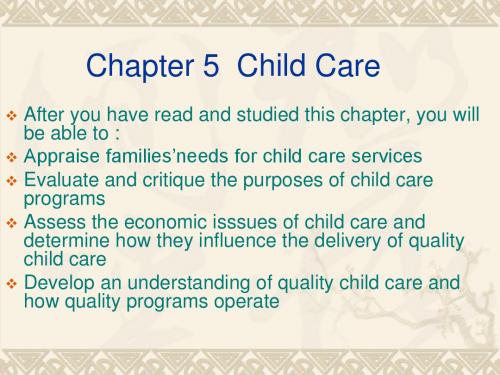
Types of Child Care Programs
Full-Service Child and Family Programs(儿童家庭全 面服务计划) While child care programs have traditionally focused on children’s needs, the trend is toward providing a wide range of services to children and their families. Family-centered programs go beyond providing child care. They help parents cope with daily living problems, enhance their parenting skills , and otherwise assist parents .
Types of Child Care Programs
Child care by Family and Relatives Child care arranged within nuclear and extended families or with friends is the most used child care arrangement. Parents handle these arrangements in various ways. Some mothers and fathers work different shifts . so one parent cares for the children while the spouse is at work. In some cases, children are cared for by grandparents, aunts , uncles, or other relatives.
论父母参加育儿培训课程的重要性英语作文

论父母参加育儿培训课程的重要性英语作文全文共3篇示例,供读者参考篇1The Importance of Parents Attending Parenting Training CoursesParenting is one of the most challenging roles in life, and many parents often find themselves struggling to navigate the complexities of raising children. In today's fast-paced world, parents are faced with a myriad of challenges, from managing their children's behavior to juggling work and family responsibilities. In order to meet these challenges head-on and provide the best possible care for their children, it is essential for parents to seek out resources and support. One valuable resource that parents can turn to is parenting training courses.Parenting training courses offer a wealth of information and guidance on how to effectively raise children and nurture their development. These courses cover a wide range of topics, including discipline, communication, child development, and emotional health. By attending these courses, parents can learnvaluable skills and strategies that can help them become more effective and confident caregivers.One of the key benefits of attending parenting training courses is the opportunity for parents to learn from experts in the field. These courses are typically taught by experienced educators, psychologists, and child development specialists who can provide valuable insights and advice. By learning from these experts, parents can gain a deeper understanding of child development and behavior, as well as learn effective strategies for managing challenging situations.Another important benefit of parenting training courses is the opportunity for parents to connect with other caregivers. Parenting can often feel isolating, and many parents struggle with feelings of loneliness or inadequacy. By attending these courses, parents can meet other caregivers who are facing similar challenges and share their experiences and insights. This sense of community and support can be invaluable in helping parents feel understood and supported.In addition to learning new skills and strategies, parenting training courses can also provide parents with a renewed sense of confidence and empowerment. Parenting can be overwhelming at times, and many parents may feel uncertain orinsecure about their abilities. By attending these courses and gaining new knowledge and skills, parents can feel more confident in their parenting abilities and better equipped to handle the challenges that come their way.Overall, the importance of parents attending parenting training courses cannot be overstated. These courses offer a valuable source of information, support, and guidance for parents as they navigate the challenges of raising children. By attending these courses, parents can learn new skills, connect with other caregivers, and gain a renewed sense of confidence and empowerment. Ultimately, investing in parenting training is an investment in the well-being and development of children, as well as the overall health and happiness of families.篇2The Importance of Parents Attending Parenting Training CoursesParenting is a challenging and rewarding journey that comes with its own set of ups and downs. In order to navigate the complexities of raising children in today's fast-paced world, it is essential for parents to equip themselves with the necessaryknowledge and skills. One way to achieve this is by attending parenting training courses.Parenting training courses provide parents with a plethora of valuable information and tools that can help them become more effective and confident parents. These courses cover a wide range of topics such as child development, discipline techniques, communication strategies, and positive parenting practices. By participating in these courses, parents can gain a better understanding of their child's needs and behaviors, as well as learn how to foster a healthy and supportive relationship with their children.Moreover, parenting training courses also offer parents the opportunity to connect with other parents and share experiences and advice. This sense of community and support can be invaluable for parents who may be feeling overwhelmed or isolated in their parenting journey. By building connections with other parents, parents can gain reassurance, guidance, and solidarity in facing the challenges of parenthood.Furthermore, attending parenting training courses can also benefit children. Research has shown that parents who participate in parenting education programs are more likely to exhibit positive parenting behaviors and have a more positiverelationship with their children. This, in turn, can lead to improved child outcomes such as better academic performance, higher self-esteem, and healthier emotional development.In conclusion, parenting training courses play a crucial role in helping parents develop the essential knowledge and skills needed to raise happy, healthy, and well-adjusted children. By participating in these courses, parents can gain valuable insights, connect with other parents, and ultimately become more confident and effective parents. Therefore, it is highly recommended for all parents to take advantage of parenting training courses and invest in their own growth and development as parents.篇3The Importance of Parents Attending Parenting Training CoursesParenting is one of the most rewarding but also challenging roles in life. With the ever-changing society and increased demands on parents, it is essential for them to continually educate themselves on effective parenting skills. This is where parenting training courses play a crucial role in helping parents navigate the ups and downs of raising children.First and foremost, parenting training courses provide parents with the necessary knowledge and skills to understand child development. Many parents may not be aware of the different stages of child development and how to effectively support their children at each stage. By attending parenting training courses, parents can learn about the physical, emotional, and cognitive development of their children, enabling them to better respond to their children's needs.Furthermore, parenting training courses can help parents learn effective communication strategies with their children. Communication is key in building strong relationships with children, and parents who are equipped with effective communication skills are better able to connect with their children and understand their thoughts and feelings. Through role-playing exercises and practical tips provided in parenting training courses, parents can learn how to communicate effectively with their children and resolve conflicts in a constructive manner.In addition, parenting training courses can provide parents with strategies to manage behavior issues in children. Many parents struggle with disciplining their children and may resort to punitive measures that are ineffective in the long run. Bylearning positive discipline techniques and setting clear boundaries, parents can create a positive and nurturing environment for their children to thrive. Parenting training courses can also educate parents on how to foster a positive relationship with their children and build their self-esteem.Moreover, parenting training courses can offer support and guidance to parents who are facing challenges in their parenting journey. Parenting can be overwhelming at times, and it is important for parents to have a support network to turn to for advice and encouragement. By attending parenting training courses, parents can connect with other parents who are going through similar experiences and share their concerns and successes. This sense of community can provide parents with the motivation and reassurance they need to continue their parenting journey.In conclusion, parenting training courses are essential for parents to equip themselves with the knowledge, skills, and support needed to raise happy and healthy children. By attending these courses, parents can learn about child development, improve their communication with their children, manage behavior issues effectively, and receive support from a community of like-minded parents. Ultimately, investing inparenting training courses is an investment in the well-being of children and the happiness of families.。
雅思满分范文作文
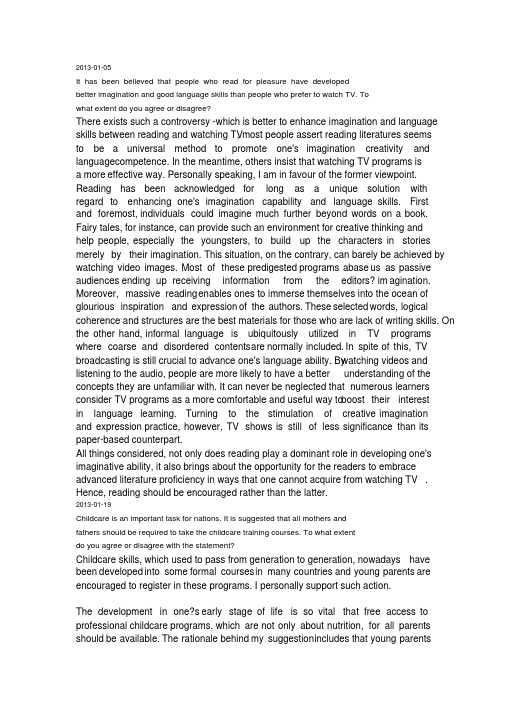
2013-01-05It has been believed that people who read for pleasure have developedbetter imagination and good language skills than people who prefer to watch TV. Towhat extent do you agree or disagree?There exists such a controversy -which is better to enhance imagination and language skills between reading and watching TV, most people assert reading literatures seemsto be a universal method to promote one's imagination creativity and language c ompetence. In the meantime, others insist that watching TV programs isa more effective way. Personally speaking, I am in favour of the former viewpoint. Reading has been acknowledged for long as a unique solution with regard to enhancing one's imagination capability and language skills. Firstand foremost, individuals could imagine much further beyond words on a book.Fairy tales, for instance, can provide such an environment for creative thinking andhelp people, especially the youngsters, to build up the characters in stories merely by their imagination. This situation, on the contrary, can barely be achieved by watching video images. Most of these predigested programs abase us as passive audiences ending up receiving information from the editors? im agination. Moreover, massive reading enables ones to immerse themselves into the ocean of glourious inspiration and expression of the authors. These selected words, logical coherence and structures are the best materials for those who are lack of writing skills. On the other hand, informal language is ubiquitously utilized in TV programs where coarse and disordered contents a re normally included. In spite of this, TV broadcasting is still crucial to advance one's language ability. By watching videos and listening to the audio, people are more likely to have a better understanding of the concepts they are unfamiliar with. It can never be neglected that numerous learners consider TV programs as a more comfortable and useful way to boost their interestin language learning. Turning to the stimulation of creative imaginationand expression practice, however, TV shows is still of less significance than its paper-based counterpart.All things considered, not only does reading play a dominant role in developing one's imaginative ability, it also brings about the opportunity for the readers to embrace advanced literature proficiency in ways that one cannot acquire from watching TV. Hence, reading should be encouraged rather than the latter.2013-01-19Childcare is an important task for nations. It is suggested that all mothers andfathers should be required to take the childcare training courses. To what extentdo you agree or disagree with the statement?Childcare skills, which used to pass from generation to generation, nowadays have been developed into some formal courses in many countries and young parents are encouraged to register in these programs. I personally support such action.The development in one?s early stage of life is so vital that free access to professional childcare programs, which are not only about nutrition, for all parents should be available. The rationale behind my suggestion i ncludes that young parentsequipped with sufficient childcare knowledge about childcare can better protect their infants or toddlers from various risks, detect possible warning signs of development delay, better understand a child?s emotional needs and help establish healthy eating habits. Overall, these parents tend to help children grow to their fullest potential physically, emotionally and intellectually and these advantages would affect the futurelife of their children for long term.It is certainly true that our grandparents never attended any parenting classes and they raised our parents with no major regret. It seems that we could keep this tradition, learning from our parents. However, this is impractical in modern society. The decreasing birth rate and smaller scale of families means that the young generation have no chance to help mum take care of their little siblings or witness the process and learn some from their mum. And they are largely no longer living under the same roof withtheir parents when they grow up and hence have little chance to learn from their parents how to raise a baby properly.It is also understandable that working parents are sometimes not in a position toget involved in formal parenting courses, especially fathers who usually are the bread earners and dedicate most of their time to their work and leave little time to their families. Nevertheless, such obstacles can be removed by flexible ways of delivering childcare courses, such as the Internet, TV or radio. Or the courses can last for a few years since young couples consider starting a family. In addition, research findings suggest that the increasing involvement of fathers in interactive activitieswith children helps with healthy development of a baby. Of course, since childcare training is related to the overall citizen quality of a nation, the government should coverall the cost and the parents do not have to worry about the fees.My personal point of view is that childcare training courses should be compulsory. They promote healthy development of a person in early stage of life, and this makes eligible parents, a happy family and a strong nation.2013-01-12In some countries, children are expected to study long hours both in and afterschool and have little free time. Does it have positive or negative effects on childrenand the society they lived in?Education, especially children's, is undoubtedly of the utmost importance to a nation's sustained economic development. In some countries, currently, a broad swath of students spend a huge amount of time working hard at school as well as after school, leading to the fact that they enjoy less leisure time.On the one hand, through continuous study children can have a thorough grasp of anin-depth knowledge which will be an asset for a lifetime. The education they receive,not only in school but at home, is not just a key to open the doors of various professions, but a social resource, enabling them to mix with many people in thefuture. In a time when it is so easy to learn whatever one would like to, the long time children spend will finally justify itself. On the other, the detrimental effects ofworking long hours on healthy growth, however, are apparent to be seen. The lasting sedentary lifestyle providing them with scarce opportunities to do physical exercisesput their health at risk. Meanwhile, long time immersion in the academic coursesdeprives of their extra-curricular activities, which would possibly fail to enable thekids to achieve physical and mental fitness. These activities pave theway for teenag ers? long-term ability to socialize and build long-lasting friendship with others, and some are even likely to contribute to discipline learning. For the society, long studying time has successfully creates an atmosphere forlearning, which in turn has far-reaching consequences for policy makers who decide what the government's education policies will be. Simultaneously, the phenomenon consequently causes increasingly fierce academic competition among peers; hence, itforwill generate various working opportunities, say, tutors or teachers of training classes, society, which will slightly release the employment burden. Students who are engaged in long-hour study, nevertheless, are likely to lose interest, leading to the fact that children's learning is inhibited. Therefore, the education system will be affected, to some extent.In conclusion, there are both upsides and downsides in terms of the issue that a considerable amount of time is spent by students on study. Only when children are encouraged to participate actively in more extra-curricular activities can they enjoythe benefits of working for a long time.2013-02-02Some people think it's all bad for children to watch TV, others believe watchingTV can bring positive effects on children when they grow up, discuss both and giveyour own opinion. Watching TV has always been an important part of after school life for children, and some of them even become TV addicts. Therefore some people advocate ,no TV for children?.Of course this is understandable. Firstly, children sitting too much time in front of a screen tend to have poor eyesight and weak body due to lack of physical exercise. They can also be lost in the virtual world and be insensitive to people around them, includingtheir parents, and this is detrimental to their family relationship and their emotional development. Another concern is about their mental development which needs various types of interactive activities, but obviously excessive TV viewing cannot meet such requirement. The worst part can be some programs which are not proper for childrento watch. Too many advertisements and news focusing on emergency and disasters on the screen are also a disadvantageous point for immature people who are prone to be influenced negatively.However watching TV in moderation with proper parental supervision can begood for children. There are plenty of educational programs which can expandnot children?s knowledge and spark their interest in exploring the world where they mayhave the opportunity to visit in real life, such as the nature and wild life. TV is not only an educational source, but is also a recreational activity. It can help enrich their after class activities. For example, children are always excited to watch cartoons and they would experience the adventure together with the characters in the show. Thepositive effects would be enlarged if children are able to share their TV time withtheir parents or peers, because they would have topics in commonand more communication can be followed.In general, I?d like to conclude that whether TV is good or bad is determined by howparents manage it. If parents limit TV hours and designate some educational and interesting programs and they keep their children accompanied, healthy viewing habit would be established and positive effects would be maximized. Otherwise, watching TV can be a worrying situation.2013-02-16Some p eople think all lawbreakers should be taken in to prison, others believe thatthere are better alternatives, (for example, being work to do which is beneficialfor local community). Discuss both views and give your own opinion.How to handle criminals is a problem that all countries and societies face. Traditionally, the approach has been to punish them by placing them in prisons to pay for what they have done. Some, however, advocate for trying to make them better with training and education and it seems they may have a good point.First and foremost, consider all the money that we have to spend to lock people up in jail. It doesn't seem like a good use of public money if the people don't actually get any better. Because most criminals eventually are let out of prison, our focus s hould be on making them better citizens.In fact, the reason why many people end up in jail in the first place is because they didn't have a good education or happy family. So if they can learn job skills they perhaps can find work and feel they can contribute in a positive way. If they do this, they won't need crime. Surly everyone deserves a second chance.Of course this does not mean that we should be too lenient on criminals. Those who commit crime should still be punished, but during their punishment they should also be treated. If we make an investment in them and show compassion, most will be able to make a new start.To summarize, we must make more of an effort to go to the root of the problem. We need to treat criminals as patients and give them the medicine they need: education and training. By giving people the skills for a second chance we can make our society safer and healthier.2012-02-23Not enough students choose science subjects in university in many countries.What're the reasons for this problem? What're the effects on the society?In some developing countries, increasing number of university students major in business, accounting, communication or computer programing rather than science. I personally believe that this is an inevitable transition in the epoch of information and globalization when capital flows worldwide and communication technology play a rolein almost every field. The changes in technology and social evolvement are being reflected in the university subject preference.First and foremost, this phenomenon is largely related to employment rate andstarting salaries upon graduation. Science undergraduates risk higher unemployment and earn less than computer programmers or businessmen and the gap may be widerin Master degree. During the economic recession, some students with interest in science may give in to the pressure in reality. Another contributor is the difficulty of science subjects that prevent many potential students from enrolling in this faculty. Picturing oneself as a scientist is not easy for a high school leaver. On top of thedifficulty of this discipline itself, the application in practice and transforming intoprofit is harder.However, science is so crucial to our human society that no country can afford the consequences of ignoring it. Science is the basis of many practical disciplines such as environment science, medical science, space science, engineering, genetic science and so forth. Without the support of general science, many other fields would find it very challenging to get further developed. What’s worse, science is directly related to our material life. We live on scientific research findings and products, ranging fromenergy supply, aircraft to numerous consumer goods. It is hard to imagine living a life without these scientific advancements.To sum up, science is less popular than before because t he society requires more professionals in other fields such as business and communication. However I?m convinced that the potential implications are negative to the health of society, hence demanding relevant solutions to reverse the trend.2013-03-02Universities and colleges are now offering qualifications through distance learningfrom the Internet rather than teachers in the classroom.Do you think the advantages of this development overweight the disadavantages?Information technology is playing an increasingly important role in our life, especially in education. Although many people are able to acquire a higher academic qualification by attending a virtual college on the Internet, some people still doubt the effectiveness of online learning and prefer the traditional way of education.Compared to distance learning, physically attending a school has some intrinsic advantages for the students? o verall development. Also, teachers can adjust their teaching styles and their instructions to best suit the characteristics of their students. In addition to academic pursuits, students? e motional and social development can be significantly improved in school due to students? p articipat ion in extra-curricular activities and events. The emotional connection that often helps to generate inspiration, creativity and emotional wellbeing is vital for young students. In essence t he experience in the non-virtual world cannot be substituted by simply receiving lectures electronically and submitting essays. Admittedly distance learning programs offer a valuable option for people with special needs, such as the disabled, full time workers or those who have families to take care of and are not able to attend class at regular hours. Another advantage is the relatively less expensive tuition feesof distance programs due to the exclusion of financial cost of campus facilities.But this way of education is restricted to knowledge delivery and requires sufficient self-discipline and time-managing abilities; therefore it is not suitable for young students except as a complimentary source, as it can act as a virtual tutor or a tool for review or reinforcement of what is learned in regular schools.Overall, I would like to conclude that remote learning programs are making a contribution to wider education receivers by supplying more chances forthe acquisition of knowledge. But they cannot be expected to surpass the overall quality of education available at a college which provides both knowledge and an environment for students? overall development. This is the key factor ineducation.2013-03-09Some people believe that studying in a college or university is the best wayfor students to prepare for their future career. Others think they should leaveschool as soon as possible to develop their career through work experience.A typical option lying in front of high school graduators is whether to continuestudy in a university or work as soon as possible. Faced with distinct people, thequestion will have various answers. Yet which is the better way for the school leavers?With quantifiable benefits of a university rooted deeply in their mind, most peoplewould favor higher education. What is well-acknowledged is that worker with aabachelor?s degree generally earns nearly double the annual income of someone withhigh school diploma. As the “knowledge economy” replaces traditional industries, this gap is only going to widen. Meanwhile, the value or impact can be measured in waysother than pound and penny. The imparted habits of mind that foster an interest forlearning, an ambition to make a difference, and an awareness t o serve others allcontribute to university students. Nevertheless, tertiary education is never the only way toa successful l ife. A slew of people would turn to occupational education andjoin in the stream of car mechanics, builders, technical workers rather than beingqualified with professional certificates. These people are undeniably well-paidcompared with the university students. Moreover, the earlier one starts his career, themore working and social experience he will accumulate, which are highly valued bynumerous employers who would prefer staff that requires less job training yet is able toachieve effective. communication and high working efficiency. Additionally, capabilityof dealing with complex issues which is not equipped by students can be anothersuperiority of a skilled worker when encountering dynamic working condition. To sumup, either going to universtity or work can be a wise choice depending on one?s interestfor can he or sheand personal traits. Only when one is doing a job he or she has passionreach the best performance. As the old saying reads, “every profession producesits own topmost master.” 2013-03-14When designing a building, the most important thing to take into account is theintended use of the building rather than its outward appearance. to what extent doyou agree or disagree. The view that function should come first in architecture is undoubtedly preferred by me, although I have no intention to deny that beauty is also an important element in construction.In essence, any building is constructed to serve a purpose, which might be accommodating, storing, recreating, entertaining, manufacturing and soforth. Therefore utility is widely recognized by most architects and the general publicas well. It is especially practical today to consider such characteristics asspatial grammar, convenience, firmness, material cost and constructionspeed in the residential construction due to the stress on house accessfrom the increasing population and the development of urbanization. Focusing on function is also a cost s aving practice as various ornaments which serve no obvious function would be simplified at the greatest extent or even eliminated.However, artistic structures can be seen in many places around the world. Humanhas the nature to pursue beauty and express their feelings through art works and architecture definitely is one of them by which this goal can be achieved. Over emphasis on architectural function tends to global similarity as international tourists have witnessed. In contrast, a building with certain aesthetic value is always uniqueand therefore adorned by local people or even foreigners and cherished as a culturalnot treasure, such as the Bird?s Nest and the Water Cube in Beijing which have beenonly an ordinary Olympic stadium or a swimming pool but also a hot tourist spot dueto their unique splendid exterior. However, the external appearance should not be themost important consideration as a good looking but less useful building is just a waste of substantial resources such as wood, steel, cement, energy sources and labor force, all of which have to be invested in construction.Overall, it would be ideal that a building satisfies both functional and aesthetic aspects. If these two cannot be achieved simultaneously, then function should be taken a s the priority instead of the outward look.2013-03-23 S cientific progress influences our daily life greatly.Do you think this is a positive or negative development?It is undeniable that technological advancement has made an unprecedented change in our daily life in the last century. Its destructive impacton our society, nonetheless, has also to be recognized.In the 20th century, a variety of significant inventions including jet planes, TV,cars, computers and telephones have fundamentally shaped our modern life, making long distance transportation more accessible and increasing international communication in many aspects including trade, culture and technology which expands our activity sphere and broadens our horizons. Moreover, our life expectancy is longer than ever before thanks to medical progress and a slew of fatal diseases such as heart disease and breast cancer can be cured. At the meantime, boosted industrial production brought by technological advancement has led us into a brand new era. For instance, robots have the capacity to dramatically improve product quality, for applications are performed with precision and high repeatability. It cannot be more a pparent that this level of consistent accuracy can be hard to achieve by any other way.However, it has been widely recognized that the benefits produced by technologydo not come at no cost. The environment deterioration makes the earth less livable largely due to the overuse of fuel sources for energy production and traffic exhaust.High efficiency of production, serving as another contributor, makes consumer goodsso cheap that people throw away food or anything out of date, which unfortunately isresponsible for the large amount of waste and meanwhile escalates the commodityproduction in turn. Overpopulation, as a consequence of the improved medical condition and better material life, has savagely deprived animals and plantsof their habitats, damaging the balance of the nature and eco-sustainability. In spiteof the medical progress, the public health ironically is not getting enhanced and the reason for this is modern sedentary lifestyle which features the addiction to TV, the computer and the internet.In conclusion, science and technology have changed our life in both positive and negative ways. While we enjoy more material affluence and convenience, we have to tolerate the contaminated environment and poor health. Maybe we should not be too optimistic about science and technology development.2013-06-15Some people think the family is the most powerful influence on child's development. Others,however, believe that other things(television, friends, music, etc.) have bigger effects.I often read some speech drafts describing the growing up of some leading figures in politics, sports, business or movie industries. They always attribute their diligence toMoremom?s determination and their generosity to the father?s intolerance.interestingly, almost the majority of Hollywood movie stars delivered their sincerethanks to their family members when they chaired the Oscar of Academy award. Therefore, I have solid reasons to believe the irrefragable function of the parental and maternal influence and other familial elements in the process of kid?s development.My recognition can be explained both by genetic traits and personal experiences. There had been a couple of research findings reporting that the genes have been always the seeds of forming the characters, intelligence quotient while the family members rooted deeply on the direction and process of character development. It can be easily concluded from the Japanese politicians who are always inherited the political vision and ambition from their father or grandfather. No matter the Shinzo Abe or American Bush family.And also we find more examples of many artists, physicians, or businessmen who seem to easily access t o success in relevant fields. such as Beethoven a nd Chinese famous nuclear physician Xueseng Qian families. Additionally, of course, most of people maybe fail to get success in career or to achieve their desired targets. However, these wisdoms overwhelm the belief that their daily behaviors and thinking abilities or even the ways they usually treat others or in some extreme occasions t hat they behaved so astonishingly similar to their father or siblings in their forte or expertise.Take my personal experience as an example, I invariably deem myself to be markedwith the common features in my family. I am especially keen on the imagination creativity and good at dealing with abstract concepts. By contrast, my neighbor,despite hard efforts he paid on writing or speech, still find extremely demanding in managing such affairs. Noticeably, he can manage the complicated trigonometric function even the matrix just a piece of cake, probably owing to his Mather who wasthe general accountant of one of famous Chinese securities company.Finally, it is still a chicken-or-egg question to say clearly about which one is thedeterminant factor in shaping the kid?s character. T he most rational and reasonable ground maybe lie on the mutual effects deriving from both the natured and nurtured factors. It is the integrated system that the familial elements planted the seeds while the television, friends, or music shaped their ways of development.。
雅思09年最难写的三道题
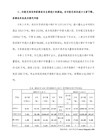
Body Paragraph 1 (第一个主体段):
Topic Sentence (中心句): 读书能够提高人们的想象力。
Potential Trap: 考生千万不要整篇文章都围绕一个点展开。
3. 立场选择:笔者选择的观点是:reading对人的想象力和语言技能的提高有更大的帮助。
Note:这里考生当然也可以选择TV这个观点,但是笔者的看法是如果偏向于TV来写的话,论据比较难找,文章充实性会有较大的问题。但是考生如果有自己的想法的话完全可以按照自己的观点来展开这篇想法。
为什么?电视节目有声音,图像,好玩,而书非常的boring.
导致的结果:人们的已经把时间浪费在电视娱乐上,而不是去从书中去获取知识;想象力和语言表达能力下降.
反方观点:电视给了人们更多的思维空间,因为接受的信息是多元的 (multi-dimensional).
摆出自己的观点: 同意书籍的影响更大。
归类分析:
这并不是危言耸听。当我们纵观一下2009年47次A类雅思议论文的题目时,发现这些题目具有以下两个特征:
1.题目越来越细节化。在09年的47道题目里面,除了个别的与往年重复的雅思考题外,我们很难再找到一些问大方面的题目。比如说在2008年的3月1日考试中,大作文题目是让学生去从所给出的十个学科中选出两科最重要的和一科不重要的。这里面有music这一科目,但是如果考生不擅长的话,完全可以不选。而在09年3月7日的考试中,直接问考生music的作用是教育还是娱乐。这里考生完全没有任何选择性,就算是对这个话题不了解,不会要英文表达,也得硬着头皮写。8月29日的Tourism话题考到了关于全球的景色越来越像的原因何解决方法。9月12日的考试问的是mothers and fathers是否应该参加childcare培训课程。
简述学前儿童健康教育活动设计的基本流程
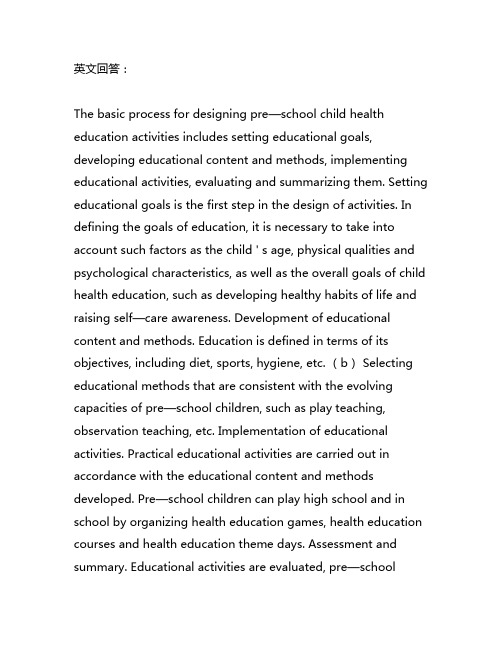
英文回答:The basic process for designing pre—school child health education activities includes setting educational goals, developing educational content and methods, implementing educational activities, evaluating and summarizing them. Setting educational goals is the first step in the design of activities. In defining the goals of education, it is necessary to take into account such factors as the child ' s age, physical qualities and psychological characteristics, as well as the overall goals of child health education, such as developing healthy habits of life and raising self—care awareness. Development of educational content and methods. Education is defined in terms of its objectives, including diet, sports, hygiene, etc. (b) Selecting educational methods that are consistent with the evolving capacities of pre—school children, such as play teaching, observation teaching, etc. Implementation of educational activities. Practical educational activities are carried out in accordance with the educational content and methods developed. Pre—school children can play high school and in school by organizing health education games, health education courses and health education theme days. Assessment and summary. Educational activities are evaluated, pre—schoolchildren ' s health literacy, behavioural change etc. are reviewed, experiences and shorings of the activities are summarized, and future health educational activities are informed.学前儿童健康教育活动设计的基本流程包括确定教育目标、制定教育内容和方法、实施教育活动、评估和总结。
学前教育专业英语词汇表
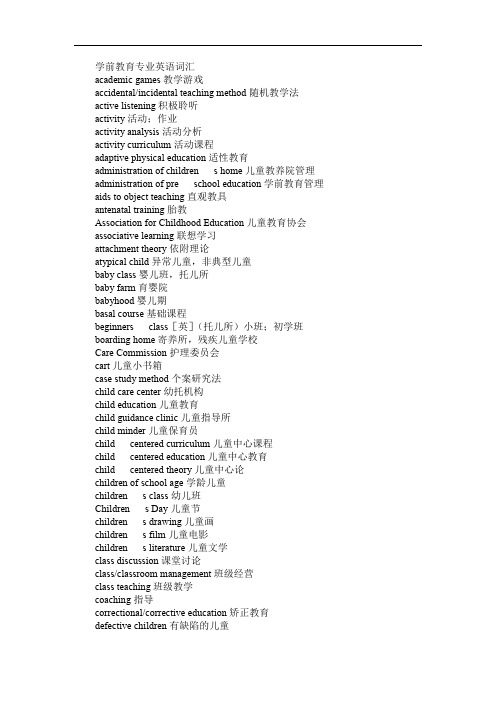
学前教育专业英语词汇academic games教学游戏accidental/incidental teaching method随机教学法active listening积极聆听activity活动;作业activity analysis活动分析activity curriculum活动课程adaptive physical education适性教育administration of children s home儿童教养院管理administration of pre school education学前教育管理aids to object teaching直观教具antenatal training胎教Association for Childhood Education儿童教育协会associative learning联想学习attachment theory依附理论atypical child异常儿童,非典型儿童baby class婴儿班,托儿所baby farm育婴院babyhood婴儿期basal course基础课程beginners class[英](托儿所)小班;初学班boarding home寄养所,残疾儿童学校Care Commission护理委员会cart儿童小书箱case study method个案研究法child care center幼托机构child education儿童教育child guidance clinic儿童指导所child minder儿童保育员child centered curriculum儿童中心课程child centered education儿童中心教育child centered theory儿童中心论children of school age学龄儿童children s class幼儿班Children s Day儿童节children s drawing儿童画children s film儿童电影children s literature儿童文学class discussion课堂讨论class/classroom management班级经营class teaching班级教学coaching指导correctional/corrective education矫正教育defective children有缺陷的儿童demonstration示范demonstration method/method of demonstration示范法demonstration teaching示范教学developmental mode of teaching发展式教学deviant child举止失常的儿童dialogic reading对话式阅读dietetics营养学differential treatment因材施教direct method of teaching直接教学法directed learning/study有指导的学习directed play有指导的游戏disadvantaged child贫穷儿童,失去受教育权利的儿童doll play玩具游戏early childhood education婴幼儿教育,早期儿童教育educability可教性education for mental retardation智能障碍教育educational approach教育方法educational cinema教育电影finger reading指读法flexible promotion弹性升级flexible shifting group plan弹性分组制foundation reader基础读物free play自由游戏Friedrich Froebel弗里德里希·福禄培尔genius天才getting at eye level平视graphical representation图示Head Start开端计划heuristic mode of teaching启发式教学home lesson家庭课业home work家庭作业incidental education随机教育individual education个别教育individual instruction/teaching个别教学individual reading个别阅读Individuals with Disabilities Education Act(IDEA)残疾人教育法案infancy婴儿期infant婴儿infant asylum育儿园,育婴堂infant education幼儿教育infant school education学前教育,幼儿教育insight learning顿悟学习institute of pre school education学前教育研究所International Association for Childhood Education(IACE)国际儿童教育协会intuitional instruction直观教学intuitive method直观法kindergarten幼儿园kindergarten education幼儿园教育kindergarten training school幼儿师范学校kinematography活动电影learning by doing做中学learning by experience从经验中学习learning through living从生活中学习learning through play玩中学level of maternal education母亲的受教育水平life long learning终身学习making eye contact做眼神交流manual training手工训练manual training room手工教室Maria Montessori玛利亚·蒙台梭利material object实物mental arithmetic心算method of dramatic expression戏剧表演法method of rediscovery再发现法method of self activity自行活动教学法method of trial and error/trial and error method尝试错误法Montessori approach蒙台梭利教学法National Association for the Education of Young Children(NAEYC)全国幼儿教育协会nursery class幼儿园nursery tale童话nursery托儿所object lesson/teaching实物教学observation method观察法organized play团体游戏out door sport户外运动out door study/work户外作业Perry project佩里计划pictorial/picture method图示教学法picture completion test填图测试play method游戏法play theory游戏理论plaything/toy玩具positive guidance积极的引导positive language积极的言语positive reinforcement正面强化pre primary education幼儿教育,学前教育preschool学龄前学校preschool children学龄前儿童preschool education学前教育preschool level学前水平preschool period学前期,幼儿期pretend play假想游戏reading method阅读法re education再教育Reggio Emilia approach瑞吉欧·埃米莉亚教学法required reading指定读物secure attachment安全型依附self fulfilling prophecy自验预言self regulation自我调节speaking instruction说话教学special didactics特殊教学法special education特殊教育speech correction class语言矫正班standing in the corner站墙角teacher education教师教育time out暂停upper kindergarten(UKG)幼儿园大班whole learning method整体学习法zone of proximal development最近发展区附录二国外学前教育研究杂志Advances in Child Development and Behavior 《儿童发育与行为进展》American Psychologist 《美国心理学家》Cognitive Development 《认知发展》Developmental Psychology 《发展心理学》Early Childhood Research Quarterly 《幼儿研究季刊》International Encyclopedia of Education 《国际教育百科全书》International Journal of Educational Development 《国际教育发展期刊》International Journal of Educational Research 《国际教育研究杂志》Journal of Educational Psychology 《教育心理学杂志》Journal of School Psychology 《学校心理学杂志》Journal of Applied Developmental Psychology 《应用发展心理学杂志》Linguistics and Education 《语言学与教育》Psychological Bulletin 《心理学公报》School Psychology Quarterly 《学校心理学季刊》附录三学前教育专业英语教学词汇一、学前教育专业英语一、二级词汇1. Animalsanimal动物bat 蝙蝠bear熊bird鸟cage笼子cat猫chicken小鸡cow奶牛crocodile鳄鱼dog狗dolphin海豚duck鸭子elephant大象fish鱼fly苍蝇frog青蛙giraffe长颈鹿goat山羊hippo河马horse马kangaroo袋鼠kitten小猫lion狮子lizard蜥蜴monkey猴子mouse老鼠panda熊猫parrot鹦鹉pet宠物puppy小狗rabbit兔子shark鲨鱼sheep绵羊snake蛇spider蜘蛛tail尾巴tiger老虎whale鲸鱼2. The Body and Facearm手臂back背beard胡须blonde金色的body身体curly弯曲的ear耳eye眼face脸hair头发hand手head头leg腿mouth嘴moustache小胡子neck脖子nose鼻子shoulder肩stomach胃straight直的tooth牙齿3. Clothesclothes衣服coat外套dress连衣裙hat帽子jacket夹克jeans牛仔裤scarf围巾shirt衬衫shoe鞋skirt裙子sock短袜sweater毛衣trousers裤子T shirtT恤衫4. Coloursblack黑色blue蓝色brown棕色green绿色grey灰色orange橙色pink粉红色purple紫色red红色white白色yellow黄色5. Family and Friendsaunt姑母,姨母,伯母,婶婶baby婴儿boy男孩brother兄弟child小孩cousin堂(表)兄弟,党(表)姐妹dad爸爸daughter女儿family家庭father父亲friend朋友girl女孩granddaughter孙女;外孙女grandfather祖父;外祖父grandma奶奶;外婆grandmother祖母;外祖母grandpa爷爷;外公grandparent祖父母;外祖父母grandson孙子;外孙grown up长大成人live居住man男人Miss小姐mother母亲Mr.先生Mrs.太太mum妈妈old老的parent父亲或母亲person人people人们sister姐妹son儿子uncle叔(伯,舅)父;姑(姨)丈woman/women女人6. Food and Drinkapple苹果banana香蕉bean豆子bottle瓶子bread面包breakfast早餐burger汉堡包cake蛋糕carrot胡萝卜cheese奶酪chicken鸡肉chips炸薯条coconut椰子coffee咖啡dinner宴会,晚餐drink饮料eat吃egg蛋fish鱼food食品fries炸薯条fruit水果grape葡萄icecream冰淇淋juice果汁lemon柠檬lemonade柠檬水lime酸橙lunch午餐mango杧果meat肉milk牛奶onion洋葱orange橙子pasta意大利面食pea豌豆pear梨picnic野餐pineapple菠萝potato土豆rice大米salad沙拉sandwich三明治sausage香肠soup汤supper晚餐tea茶thirsty渴的tomato西红柿vegetable蔬菜watermelon西瓜7. Healthcold冷cough咳嗽dentist牙医earache耳朵痛fine不错headache头疼hospital医院hurt疼stomachache胃痛temperature温度toothache牙疼8. The Homeapartment公寓armchair扶手椅子balcony阳台basement地下室bath沐浴bathroom浴室bed床bedroom卧室blanket毛毯bookcase书架box盒子camera照相机chair椅子clock时钟computer计算机cupboard橱柜desk书桌dining room饭厅doll玩偶,玩具娃娃door门downstairs在楼下dream梦elevator电梯fan扇子flat公寓floor地板flower花garden花园hall门厅home家house房子kitchen厨房lamp台灯lift电梯living room客厅mat垫子mirror镜子painting画phone电话picture图画radio收音机room房间shopping购物shower淋浴sleep睡觉sofa沙发stair台阶table桌子television电视toothbrush牙刷towel毛巾toy玩具tree树upstairs在楼上wall墙壁wash洗watch手表window窗户9. Numbersone一two二three三four四five五six六seven七eight八nine九ten十eleven十一twelve十二thirteen十三fourteen十四fifteen十五sixteen十六seventeen十七eighteen十八nineteen十九twenty二十twenty one二十一thirty two三十二forty四十forty three四十三fifty五十fifty four五十四sixty five六十五seventy six七十六eighty seven八十七ninety eight九十八a hundred一百first第一second第二third第三fourth第四fifth第五sixth第六seventh第七eighth第八ninth第九tenth第十eleventh第十一twelfth第十二thirteenth第十三fourteenth第十四fifteenth第十五sixteenth第十六seventeenth第十七eighteenth第十八nineteenth第十九twentieth第二十10. Placesbank银行cafe咖啡馆cinema电影院farm农场here这里hospital医院library图书馆map地图market市场park公园place地方playground运动场road道路shop商店square广场store商店street街道supermarket超级市场swimming pool游泳池there那里zoo动物园11. Schoolalphabet字母answer回答ask问board板book书class班级classroom教室close关闭colour颜色correct纠正draw画画English英语eraser橡皮擦example例子find发现homework家庭作业know知道learn学习lesson课程letter信line线listen听look看mistake错误name名字number数字open打开page页part部分pencil铅笔question问题read阅读right正确rubber橡皮ruler尺子school学校sentence句子spell拼写story故事tell告诉test测试text课文tick打钩understand理解word单词write写12. Sports and Leisurebadminton羽毛球ball球baseball棒球basketball篮球bat球拍book书bounce跳CD激光唱碟comic连环图画/漫画drive驾车DVD数字化视频光盘enjoy享受favourite喜欢的事物film电影football足球game游戏guitar吉他hit打hobby爱好hockey曲棍球holiday假日jump跳跃kick踢kite风筝movie电影music音乐paint涂色party聚会photo照片piano钢琴play玩耍present礼物radio收音机run奔跑sing唱skate溜冰soccer足球song歌曲sport体育运动sports centre体育运动中心swim游泳table tennis桌球tennis网球throw投TV电视video录像机walk散步13. Timeafter在……之后afternoon下午age年龄always总是before以前birthday生日clock钟表day白天end结束evening晚上every每个morning早晨never从不night夜晚sometimes有时today今天watch手表week星期weekend周末yesterday昨天the days of the week一周的日子Sunday星期日Monday星期一Tuesday星期二Wednesday星期三Thursday星期四Friday星期五Saturday星期六14. Toyslorry卡车monster怪物robot机器人treasure宝物15. Transportbike自行车boat船bus公共汽车bus station公共汽车站car小汽车drive驾车driver驾驶员fly飞行go跑helicopter直升机motorbike摩托车plane飞机ride骑ticket票train火车truck卡车16. Weathercloud云cloudy多云的rain雨rainbow彩虹snow雪sunny阳光充足的weather天气wind风windy有风的17. Workclown小丑doctor医生farmer农民nurse护士pirate海盗teacher老师18. The World Around Usbeach海滩city城市country国家field田野forest森林grass草ground地面island岛jungle丛林lake湖leaf叶子moon月亮mountain山plant植物river河road道路rock岩石sand沙子sea海洋shell贝壳star星星sun太阳town城镇tree树village村庄waterfall瀑布world世界19. Useful Words and Expressions bye/goodbye再见come on加油excuse me对不起hello你好no不OK好的please请see you再见so如此sorry对不起thank you谢谢你thanks谢谢then然后well好well done做得好wow哇yes是的20. Adjectivesafraid害怕的all所有的angry生气的awake醒的back后面的bad坏的beautiful美丽的best最好的better更好的big大的boring无聊的bottom底部的busy忙碌的careful小心谨慎的clean干净的clever聪明的closed关闭着的correct正确的different不同的difficult困难的dirty脏的double双倍的easy容易的English英文的exciting令人兴奋的famous出名的fat胖的favourite特别喜爱的fine好的funny好笑的good好的great伟大的,杰出的happy快乐的hot热的last最后的long长的loud大声的more更多的most大部分的naughty顽皮的new新的nice美好的old旧的quick快的quiet安静的right正确的round圆的sad伤心的short短的slow慢的small小的sorry难过的square方形的strong强壮的surprised惊讶的tall高的terrible可怕的thin瘦的tired疲乏的top最高的ugly丑陋的weak弱的well健康的wet湿的worse更坏的worst最坏的wrong错误的21. Determinersa/an一(个)all所有的a lot of许多another另外的any任何的both两者的every每个lots of许多many许多more较多的most大部分one一个some一些that那个the指已提到的人(物)these这些this这个those那些22. Adverbsa lot很多again再all right好always总是back向后badly恶劣地carefully仔细地how怎样how much多少how often多久一次last最后loudly大声地more更多most最多near在附近never从不not不now现在off离开often经常only仅仅out在外outside在外面quickly迅速地quietly安静地slowly慢地then那么there在那里today如今too太up向上very很well好when什么时候worse更糟地worst最糟地23. Prepositionsabout关于above在……之上after在……之后at在before在……之前behind在……的后面below在……的下方between在两者之间by在……的旁边down向下for为from来自in在……的里面in front of在……的前面inside在……的里面like像near在……的附近next to在……的隔壁of属于……的on在……的上面opposite在……的对面out of由于outside在……的外面round在……的周围than超过to向under在……的下面with和,以24. Conjunctionsand和because因为but但是or或者than比when当……的时候25. Pronounsall全部both两者都he他her她hers她的him他his他的I我it它its它的me我mine我的more更多的或附加的人或物nothing没有任何东西one某人ours我们的she她something某物that那个theirs他(她,它)们的them他(她,它)们these这些they他(她,它)们this这个those那些us我们we我们which哪一个who谁you你,你们yours你(们)的26. Verbs1)Irregular Verbsbe(am,is,are)是bring带来buy买catch抓choose选择come来do做draw画drink喝eat吃find发现get获得get up起床give给go去have有hide躲藏hit打hold握住hurt受伤know知道lose丢失make制造mean意谓put放read读say说see看见sit坐sleep睡觉spell拼写stand站take拿走tell告诉think思考throw扔wake up醒来wear穿2)Regular Verbsadd增加bounce弹起call呼叫carry运送clean清扫climb爬close关cook烹调colour上色complete完成cross横过cry哭dance跳舞dream做梦drop落下email发邮件enjoy喜爱film拍电影fish钓鱼help帮助hop单脚跳invite邀请jump跳跃laugh笑like喜欢live居住look看look at看look for寻找love爱move移动need需要open打开phone打电话pick up捡起plant种植point指向rain下雨sail航行shop购物shout喊叫show展示skip跳smile微笑snow下雪start开始stop停talk谈话text发短信try试wait等want想要wash洗watch观看wave挥手3)Modalscan/can t能/不能could能(can的过去式)must必须shall将will愿意would想要(will的过去式)27. Question Wordshow怎样how many多少(后接可数名词)how much多少(后接不可数名词)how often多久一次how old多大what什么when什么时候where哪里which哪一个who谁whose谁的why为什么28. NamesAlex亚历克斯Ann安Anna安娜Ben本Bill比尔Daisy黛西Fred弗雷德Jack杰克Jane简Jill吉尔Jim吉姆John约翰Kim金Lucy露西Mary玛丽May梅Nick尼克Pat帕特Paul保罗Peter彼得Sally萨莉Sam萨姆Sue休Tom汤姆Tony托尼Vicky维基二、学前教育专业英语三级词汇1. Expressions in Communicationall right好吧—Will you send this card for me?—Yes, all right.of course (not)当然(不)—Will you come back again?—Of course.pardon对不起,请再说一遍—It s time to get off the bus.—Pardon?—I said it s time to get off the bus.2. Modal Verbsbe going to打算,准备may可能might可能(may的过去式)should将要(shall的过去式)3. Animalsbutterfly蝴蝶camel骆驼dinosaur恐龙insect昆虫octopus章鱼swan天鹅4. Trafficairport机场ambulance救护车fire engine消防车bicycle自行车rocket火箭kilometre千米station车站taxi出租车traffic交通way道路corner角落5. Buildings and Placesbookshop书店bridge桥castle城堡cave洞穴college学院,大学factory工厂fire station消防局front前面,前线hill小山hotel旅馆London伦敦museum博物馆office办公室post office邮局pyramid金字塔police station警察局restaurant餐馆,饭店theatre剧场,戏院toilet洗手间university大学6. Personal Informationaddress地址surname姓telephone电话7. Directionseast东方,东部north北方,北部south南方,南部west西方,西部8. Peopleactor男演员actress女演员artist艺术家astronaut宇航员businessman男商人businesswoman女商人chemist化学家,药剂师dentist牙医engineer工程师fireman消防员firewoman女消防员footballer足球运动员,足球选手husband丈夫job工作(同义词work)journalist新闻记者mechanic技工,机械工nurse护士painter画家photographer摄影者pilot飞行员policeman男警员policewoman女警员queen王后,女王secretary秘书singer歌手student学生tennis player网球运动员wife妻子9. Daily Articlesbin箱,柜brush刷子comb梳子drum鼓flashlight手电筒medicine药,药品scissors剪刀shelf架子soap肥皂fridge电冰箱suitcase手提箱,衣箱umbrella伞10. Subjectsgeography地理学history历史学maths数学science科学11. Stationery and Studycard卡片diary日记dictionary字典envelope信封exam检查,考试glue胶水key答案magazine杂志news新闻newspaper报纸postcard明信片problem问题stamp邮票subject主题,题目tape recorder磁带录音机12. Foodbiscuit饼干cookie饼干butter黄油chocolate巧克力dinner正餐flour面粉jam果酱meal餐,饭pepper胡椒粉,辣椒pizza比萨饼salt盐snack快餐,小吃sugar食糖13. Table Warechopsticks筷子cooker炊具fork叉子knife小刀plate盘子spoon匙14. Timea.m. 上午century世纪date日期future将来,未来half半,一半hour小时midday正午midnight午夜minute分钟o clock点钟p.m. 下午quarter一刻钟tomorrow明天tonight今天晚上year年15. Seasonsspring春天summer夏天autumn秋天winter冬天16. Monthsmonth月January一月February二月March三月April四月May五月June六月July七月August八月September九月October十月November十一月December十二月17. FestivalsChristmas圣诞节Easter复活节18. Materialsfur毛皮glass玻璃gold金metal金属paper纸plastic塑料silver银,银子wood木头wool羊毛19. Clothesbelt带,带子glove手套pocket口袋shorts短裤tights紧身衣uniform制服20. Activitiescircus马戏,马戏团club俱乐部competition比赛golf高尔夫player比赛者programme节目race比赛sledge雪橇snowball雪球snowman雪人team队tent帐篷torch火炬volleyball排球21. Adjectivesbrave勇敢的broken坏掉的bored烦人的cheap便宜的clever聪明的(反义词stupid)dangerous危险的(反义词safe)dark黑暗的(同义词black;反义词bright)dear亲爱的dry干的(反义词wet)empty空的(反义词full)enough足够的(反义词short)excellent卓越的,极好的excited兴奋的expensive昂贵的(同义词dear)extinct灭绝的(反义词prosperous)far远的fast快的(反义词slow)friendly友好的full满的,充满的,吃饱的fun有趣的high高的horrible可怕的heavy沉的,重的(反义词light)ill生病的important重要的(反义词unimportant)interesting有趣的kind和蔼的,亲切的late晚的,迟到的long长的(反义词short)lovely可爱的,美好的(反义词miserable)low低的married已婚的missing缺少的near附近的next下一个的,下次的nice好的noisy嘈杂的poor贫穷的ready准备就绪的(同义词prepared)rich富有的right正确的,合适的same同样的(反义词different)single单一的soft软的(反义词hard)spotted有斑点的strange陌生的striped有斑纹的sure确信的sweet甜的(反义词bitter)tidy整洁的unfriendly不友好的unhappy不高兴的(同义词sad)untidy凌乱的(反义词tidy)warm温暖的worse更坏的,更差的(反义词better)worst最坏的(反义词best)22. Adverbsago以前already已经also也anywhere任何地方away在远处,离去early早else另外,其他ever也,曾经everywhere到处,无论哪里hard努力地just正好,刚才later后来,以后nowhere无处,什么地方都不perhaps或许,可能somewhere某个地方,某些地方soon不久以后still仍,仍然suddenly突然,忽然together一起,共同too也twice两次,两倍yet仍,更usually通常23. Pronounsanyone任何人anything任何事物each各自,每个everyone每个人everything每件事,一切none没人no one没有一个someone某人,某些人other其他的24. Conjunctionsif如果once一旦since自从;由于so因此,所以。
美国各级政府与学前儿童的保育和教育

美国各级政府与学前儿童的保育和教育本文将论述美国联邦政府、州政府和地方政府在学前儿童的保育和教育方面扮演的角色和担负的职责。
因为中美两国教育体制上的差异, 在谈论早期保育和教育(Early Care and Education)之前, 有必要对早期保教的几个名称略加说明。
在美国, 学前教育意指5岁前的儿童( 包括5岁) 在未正式入学之前接受的教育。
Kindergarten是5岁儿童的学习场所, 是在入读公办或民办小学一年级(first grade)之前的一个年级。
Preschool则是3岁和4岁儿童未入读kindergarten前就读的学前班或幼儿园。
3岁以下儿童入托或入读的园所则被称为婴幼儿计划(Infant/Toddler Program)。
Kindergarten最先是由德裔移民自德国引入美国的。
早在1873年, 美国第一所公办Kindergarten即在圣路易(St. Louis)的公办学校成立。
然而,Kindergarten的普及却经历了整整一个世纪, 直到20世纪70年代才在全美的公办学校中普及。
如今,Kindergarten 已成为美国正规国民教育(public education)学制的起点。
自Kindergarten至十二年级高中毕业的国民教育即是一般所指的简称为K-12的教育体制。
有鉴于学前教育是在正规学制之外进行的,因此在讨论美国各级政府在学前儿童保育和教育上所担负的职责之前, 必须对美国政府在办理包括Kindergarten在内的国民教育方面的职责略作解释。
在国民教育方面, 联邦政府并未制定义务教育的法令, 也未制订全国性的课程标准。
在1979年之前, 美国甚至没有设立过一个统辖教育的独立内阁部门。
在设立联邦教育部之前, 有关卫生、教育和福利的一切事务均合并隶属于卫生、教育和福利部(Department of Health, Education, and Welfare)。
英语辩论should-women-stay--home-or-go-to-work
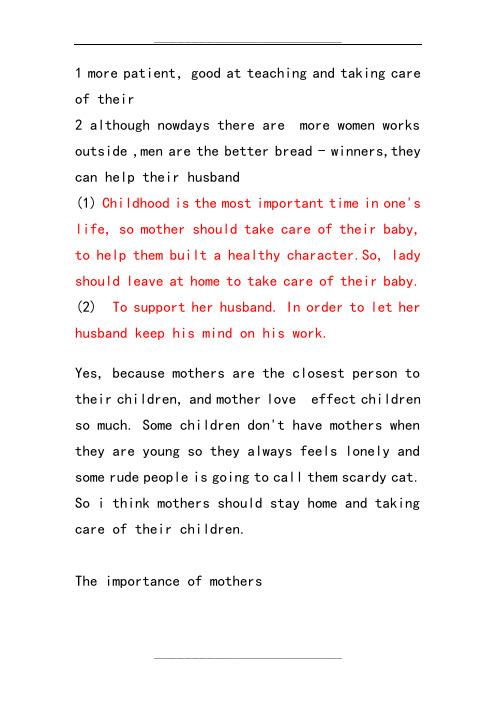
1 more patient,good at teaching and taking care of their2 although nowdays there are more women works outside ,men are the better bread - winners,they can help their husband(1) Childhood is the most important time in one's life, so mother should take care of their baby, to help them built a healthy character.So, lady should leave at home to take care of their baby.(2) To support her husband. In order to let her husband keep his mind on his work.Yes, because mothers are the closest person to their children, and mother love effect children so much. Some children don't have mothers when they are young so they always feels lonely and some rude people is going to call them scardy cat. So i think mothers should stay home and taking care of their children.The importance of mothersMoms, did you ever question your value as a role model, caretaker, administer of hugs andBand-Aids? I think we all have in today's climate of "do more, get more, have more." Many of us work to bring home a paycheck and others work for our sanity. Have you ever wondered if your children were better off with the baby sitter than you? Scientific studies are beginning to point to the overwhelming value of a mother's love, hugs and support. Nannies, baby-sitters and relatives are terrific. They just aren't as terrific as Mom.I have had the best of both worlds, I suspect. I worked a high-powered executive job until my older daughter was 2 and a half. At a crossroads in my career, I opted to "get pregnant and stay home for a year." HA! Little did I realize I was about to take a ten-year hiatus from my much-loved life! I didn't get pregnant right away, but, after having spent a year basking in the glow of being Mom, I couldn't bear giving up the care and nurturing of my daughter to another nanny, nomatter how wonderful. I think it was the best career move of my life.Well, ten years later, I am back in the work force and thriving. Yes, I felt bored much of the time. Yes, our family sacrificed the bigger house, fancier cars and vacations some of our peers were enjoying. But it was a conscious decision to sacrifice for the benefit of our children. We wanted our morals, our ethics and our life lessons to influence our children.I think moms can work at home, be homemakers or work outside of the home and still be great moms. The most important part of mothering, I feel, is being there for our children. Maybe your sacrifice is going to work but spending your precious little free time reading your child a bedtime story every night, taking him to the park on Saturdays or chaperoning your daughter's school dance. What matters is our input, the confidence in our roles as mothers and knowing weare the best person for the role ... to understand how valuable we are to society.Pat yourselves on the backs ... you've accomplished a miracle! There is no greater sacrifice on earth, in my opinion, than making the decision to be a parent. Know how important you are. Know that your children need you to be as solid an individual as you can be. Therein lies your strength as a mother, whether you spend all day at home or in an office. We are all exceptional women in our motherhood.Babies given more love and affection by their mothers deal better with stress and anxiety when they grow up, research has shown.The study looked at eight-month-old children - meaning even the very earliest life experiences which we do not remember in adulthood can influence our well-being.Lots of maternal(母亲的) love makes children form a secure bond with their mothers, meaning they are able to feel secure in relationships whengrown up, will have better social skills and cope better with life's difficulties, the study found.Despite growing interest in how early life affects us in adulthood, most previous studies have relied on people's recollections(回忆,记忆) - whereas this research tracked participants from early childhood to adult life.The researchers, led by Dr Joanna Maselko of Duke University in North Carolina, rated the relationships of 482 eight-month-old babies with their mothers during routine developmental assessment.They looked at how well the mother had coped with her child's developmental tests and how she had responded to the child's performance.The amount of affection and attention she gave to her child was categorised into groups ranging from 'negative' to ' extravagant(奢侈的,浪费的) '.Mental health was then assessed when the babies had grown up - at the average age of 34.Adults whose mothers had been the mostaffectionate(深情的) during their assessment as babies had the lowest levels of anxiety, hostility and general distress.First statement :In today's society, women often feel that to be seen as successful, they should have to balance their career, children and their marriage. However, most women are force to stay at home to raise children and give up their own career. It’s unfair for women to devote all her lifetime in family instead of catching up the opportunities to live whatever they want. So our group insists that women shouldn’t stay at home to raise children, here is our main points.First, women and men are born to be equal, there’s no any saying that women are born to raise child and they have to scarify their own life. Women also have the ability and drive to do many things a man can do. They have the legalright as anyone else to decide what is best for them and their children.Second, in china, parents need a lot of money to raise children. A single income is not enough to comfortably support a family, especially those single families. Mothers have to get out working so as to ensure that their children have the best start in life. They can afford the best education and best quality of lifestyle.Third, many forms of childcare can be beneficial and complimentary to the care provided by parents. Older generations such as grandparents could hands on experience with young children and also the childcare professionals have similar experience and they often take courses on child development, which makes them more knowledgeable than a first time parents. And I think this would help to improve children’s social skills and more independent than those who rely on their parents.In a word, women shouldn’t stay at home to raise their children.Main points :1. Don't you want yourself(your daughters) to have the sameopportunities as men?2. How can mothers teach theirkids life lessons if as soon as they had kids, they stopped learning themselves?3. How do you think of the equalright between men and women? Do you think that is equal for women to stay at home to raise children?4. When you graduate fromcollege, do you willing to just be a housewife and throw away your professional knowledge that you have been learning for years?5. Some children arerebellious, because their mothers always wantthem to obey many roles, and this willdefinitely lead to a very bad relationship. How do you think about that?6. In what ways can you achieveyour personal values? Staying at home to raise child is a good way?Supporting ideas:1. Mothers should have muchfreedom as anyone else in society to decide what is best for them and their children. It would cause depression if women are forced to give up work they enjoy to care for theirchildren.2. Expecting mothers to stay athome will also make the children more dependent upon their parents.3. Playing with other childrenis just as important for improving children’ssocial skills as contact with their parents.Nurseries and childminders can be good place to expose children to other children.4. Focusing on the mother willneglects the responsibilities of the father, other family members in raising the children.5. Encouraging mothers to workincrease the number of people in the workforce thereby increasing the productivity of the country. This also helps to create jobs in the childcare sector, generating employment for more people.6. Teenagers especially tendto disengage from their parents, and this can leave a stay-at-home mom very confused, and tends to make her feel somewhatworthless because they feel they are owed somehow for having sacrificed so much to stay at home and raise their children7. Women get out workingdoesn’t mean that they can’t balance both the work and their family. After work, they still have time to play with kids.8. Women stay at home would befar away from the outside world, they know little, and this will lead to the generation gap.9. It’s not enough to having asingle income for a family, when you want to offer a better education and quality oflifestyle to the children.10. Working will make the women moreconfident and lead a very good model for their children.11. Staying at home, women would findthemselves worthless.妈妈在外工作对孩子的直接影响是和孩子沟通的时间少了孩子和妈妈可能不如全职妈妈和孩子们亲.孩子没了撒娇对象可能会造成些心理上的自卑.此外孩子由于缺乏监管,容易外出寻找一些刺激.容易变坏.间接影响是母亲通常会因没能足够时间陪孩子而感到内疚,对孩子在金钱物质上容易满足,某些方面特别溺爱.使孩子养成娇惯的坏毛病.一些此领域的研究人员通过抽样调查,发现在母亲在外工作的孩子在阅读能力和算数能力上不如全职母亲照顾的孩子强,full-time housewifeMothers work outside the direct impact on children and children less time to communicate the child and mother may not be as pro-full-time mother and the children. Not a spoiled child object may cause some psychological sense of inferiority. In addition the child due to lack of supervision, easy go looking for some excitement. vulnerable. indirect effects of the mother, usually accompanied by sufficient time did not feel guilty about their children, money and material for children in easy to meet,particularly fond of certain aspects. so that children develop bad habits pampered. Some researchers in this field through the sample survey, found that children of mothers working outside the reading ability and arithmetic ability in not as good as full-time mother to take care of the child strong,世界卫生组织出版了英国心理分析学家约翰.波尔比的《母亲照顾及心理健康》一书。
特殊儿童教育英文

特殊儿童教育英文Education for Children with Special NeedsIn today's diverse society, the education system must be inclusive and cater to the needs of all children, including those with special needs. This group encompasses a wide range of conditions, from physical disabilities to learning difficulties and developmental disorders. The goal of special education is to provide these children with the necessary support and resources to help them reach their full potential.One of the key aspects of special education is the individualized education program (IEP). This is apersonalized plan that is developed for each child, takinginto account their unique strengths and challenges. The IEPis a collaborative effort between parents, teachers, andoften therapists and specialists, ensuring that the child's educational experience is tailored to their specific needs.Another critical component of special education is the provision of support services. This can include speech therapy, occupational therapy, and physical therapy, all of which can help children with special needs to developimportant skills and improve their quality of life. These services are often integrated into the child's daily routine, allowing them to receive the support they need without being removed from their regular classroom environment.Inclusive classrooms are also an essential part ofspecial education. In these settings, children with special needs are educated alongside their peers without disabilities. This not only promotes a sense of community and belonging but also fosters understanding and empathy among all students. Teachers in inclusive classrooms are trained to differentiate their instruction to meet the diverse needs of all learners.Technology plays a significant role in special educationas well. Assistive technologies, such as speech-to-text software and specialized learning apps, can help childrenwith special needs to overcome barriers to learning. These tools can be particularly beneficial for students with cognitive or physical disabilities, allowing them toparticipate more fully in educational activities.Finally, it is important to recognize the importance of early intervention. Identifying and addressing the needs of children with special needs at a young age can significantly improve their long-term outcomes. Early intervention services can provide the necessary support to help these children develop foundational skills and prepare them for success in school and beyond.In conclusion, special education is a vital part of our educational system, ensuring that all children have the opportunity to learn and grow. By providing individualized support, inclusive classrooms, and access to technology and early intervention, we can help children with special needsto thrive and achieve their goals.。
美国幼儿补偿教育方案简介

美国幼儿补偿教育方案简介20世纪50年代以来,随着二战的结束,美国工业得到迅速发展,国家经济水平大大提高,然而相伴而来的却是国内贫富差距的不断扩大。
由于贫困,不少低收入家庭的子女(多为黑人家庭和少数民族族裔家庭的子女)往往被排除在教育,特别是学前教育之外。
由于很难获得与一般儿童同等的教育环境和教育机会,这些孩子在发展过程中往往会受到许多不良因素的影响。
等到他们进入义务教育的年龄阶段时,常常处于一种明显不利的地位。
面对这种教育不公的状况以及越来越多的城市暴力犯罪和骚乱,面对一些有识之士的呼吁和广大贫民和黑人的强烈要求,美国于20世纪60年代掀起了一场引人注目的“幼儿补偿教育运动”。
为了减少低收入家庭儿童所受的不利影响,有关部门制定了一系列的幼儿补偿教育方案,为低收入家庭的儿童提供同等的学前教育机会,以促进儿童的健康发展。
一、幼儿补偿教育方案的目的和种类尽管美国的幼儿补偿教育方案在制定时间、内容要求和具体目标等方面都有所差别,但它们的目的是一致的,即通过补偿方案和特殊活动(即一定程度的干预),使众多贫困、偏远地区和少数民族家庭的儿童在教育的不足方面得到补偿,从而为这些儿童的发展提供更多的机会,在最大程度上挖掘他们的潜能,帮助他们获得身体和心理上的健康成长。
根据适用对象、涉及内容的不同,美国的幼儿补偿教育方案可以分为以下几种:1.婴儿出生前以孕妇保健为主要内容的方案,如产前/早期婴儿方案、耶鲁儿童福利方案;2.以婴儿保教为主要内容的方案,如米尔沃基方案(the Milwaukee Project)、辛拉丘斯大学家庭发展研究方案、艾伯先丹瑞恩方案、婴儿健康与发展方案、保育方案以及布鲁克林早期教育方案等;3.从3、4岁学前儿童开始的以保教为主要内容的有关方案,如佩里学前教育方案(the Perry Preschool Project)、早期训练方案、芝加哥儿童一父母中心及其扩展方案和提前开端计划(Head Start Progarm );4.以家庭干预为主要内容的方案,如口语交流方案(在家庭内部为2岁或3岁的孩子提供适当的言语刺激)、休斯顿亲子发展中心方案(对独生子女家庭实行干预)及哈莱姆研究方案等。
美国早期学习标准解读
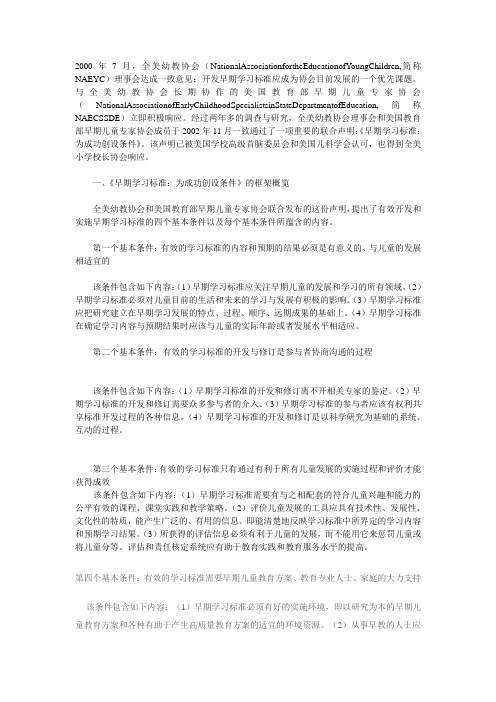
2000年7月,全美幼教协会(NationalAssociationfortheEducationofYoungChildren,简称NAEYC)理事会达成一致意见:开发早期学习标准应成为协会目前发展的一个优先课题。
与全美幼教协会长期协作的美国教育部早期儿童专家协会(NationalAssociationofEarlyChildhoodSpecialistsinStateDepartmentofEducation,简称NAECSSDE)立即积极响应。
经过两年多的调查与研究,全美幼教协会理事会和美国教育部早期儿童专家协会成员于2002年11月一致通过了一项重要的联合声明:《早期学习标准:为成功创设条件》。
该声明已被美国学校高级首脑委员会和美国儿科学会认可,也得到全美小学校长协会响应。
一、《早期学习标准:为成功创设条件》的框架概览全美幼教协会和美国教育部早期儿童专家协会联合发布的这份声明,提出了有效开发和实施早期学习标准的四个基本条件以及每个基本条件所蕴含的内容。
第一个基本条件:有效的学习标准的内容和预期的结果必须是有意义的、与儿童的发展相适宜的该条件包含如下内容:(1)早期学习标准应关注早期儿童的发展和学习的所有领域。
(2)早期学习标准必须对儿童目前的生活和未来的学习与发展有积极的影响。
(3)早期学习标准应把研究建立在早期学习发展的特点、过程、顺序、远期成果的基础上。
(4)早期学习标准在确定学习内容与预期结果时应该与儿童的实际年龄或者发展水平相适应。
第二个基本条件:有效的学习标准的开发与修订是参与者协商沟通的过程该条件包含如下内容:(1)早期学习标准的开发和修订离不开相关专家的鉴定。
(2)早期学习标准的开发和修订需要众多参与者的介入。
(3)早期学习标准的参与者应该有权利共享标准开发过程的各种信息。
(4)早期学习标准的开发和修订是以科学研究为基础的系统、互动的过程。
第三个基本条件:有效的学习标准只有通过有利于所有儿童发展的实施过程和评价才能获得成效该条件包含如下内容:(1)早期学习标准需要有与之相配套的符合儿童兴趣和能力的公平有效的课程、课堂实践和教学策略。
选婴幼儿托育服务与管理作文

选婴幼儿托育服务与管理作文英文回答:Choosing infant and toddler care services and management is an important decision for parents. There are several factors to consider when making this choice.Firstly, parents should consider the qualifications and experience of the caregivers. It is crucial to ensure that the caregivers have the necessary training and expertise to take care of young children. For example, they should have knowledge of child development, first aid, and safety protocols. Additionally, it is important to assess the caregiver's experience in handling different situationsthat may arise while caring for infants and toddlers.Secondly, parents should consider the environment and facilities provided by the care center. The center should have a safe and clean environment that is conducive to the development and well-being of the child. For instance, thecenter should have age-appropriate toys, a designated sleeping area, and a separate area for diaper changing. It is also important to ensure that the center has proper safety measures in place, such as childproofing and secure entrances.Thirdly, parents should consider the curriculum and activities offered by the care center. A good care center should provide a variety of age-appropriate activities that promote the child's physical, cognitive, and social development. For example, the center may offer music and movement classes, sensory play, and outdoor activities. It is important for parents to choose a care center that aligns with their child's interests and provides a well-rounded learning experience.Lastly, parents should consider the communication and involvement of the caregivers. It is important for parents to have regular updates on their child's progress and activities. The caregivers should be open to discussing any concerns or questions that parents may have. Additionally, parents should feel welcome to participate in activitiesand events organized by the care center, such as parent-teacher meetings or family days.中文回答:选择婴幼儿托育服务与管理是家长们的重要决策。
英国幼儿教育
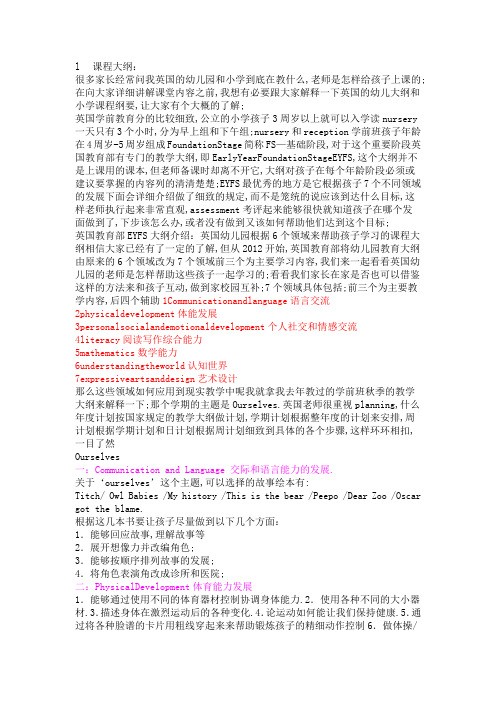
l 课程大纲:很多家长经常问我英国的幼儿园和小学到底在教什么,老师是怎样给孩子上课的;在向大家详细讲解课堂内容之前,我想有必要跟大家解释一下英国的幼儿大纲和小学课程纲要,让大家有个大概的了解;英国学前教育分的比较细致,公立的小学孩子3周岁以上就可以入学读nursery 一天只有3个小时,分为早上组和下午组;nursery和reception学前班孩子年龄在4周岁-5周岁组成FoundationStage简称FS—基础阶段,对于这个重要阶段英国教育部有专门的教学大纲,即EarlyYearFoundationStageEYFS,这个大纲并不是上课用的课本,但老师备课时却离不开它,大纲对孩子在每个年龄阶段必须或建议要掌握的内容列的清清楚楚;EYFS最优秀的地方是它根据孩子7个不同领域的发展下面会详细介绍做了细致的规定,而不是笼统的说应该到达什么目标,这样老师执行起来非常直观,assessment考评起来能够很快就知道孩子在哪个发面做到了,下步该怎么办,或者没有做到又该如何帮助他们达到这个目标;英国教育部EYFS大纲介绍:英国幼儿园根据6个领域来帮助孩子学习的课程大纲相信大家已经有了一定的了解,但从2012开始,英国教育部将幼儿园教育大纲由原来的6个领域改为7个领域前三个为主要学习内容,我们来一起看看英国幼儿园的老师是怎样帮助这些孩子一起学习的;看看我们家长在家是否也可以借鉴这样的方法来和孩子互动,做到家校园互补;7个领域具体包括;前三个为主要教学内容,后四个辅助1Communicationandlanguage语言交流2physicaldevelopment体能发展3personalsocialandemotionaldevelopment个人社交和情感交流4literacy阅读写作综合能力5mathematics数学能力6understandingtheworld认知世界7expressiveartsanddesign艺术设计那么这些领域如何应用到现实教学中呢我就拿我去年教过的学前班秋季的教学大纲来解释一下;那个学期的主题是Ourselves.英国老师很重视planning,什么年度计划按国家规定的教学大纲做计划,学期计划根据整年度的计划来安排,周计划根据学期计划和日计划根据周计划细致到具体的各个步骤,这样环环相扣,一目了然Ourselves一:Communication and Language 交际和语言能力的发展.关于‘ourselves’这个主题,可以选择的故事绘本有:Titch/ Owl Babies /My history /This is the bear /Peepo /Dear Zoo /Oscar got the blame.根据这几本书要让孩子尽量做到以下几个方面:1.能够回应故事,理解故事等2.展开想像力并改编角色;3.能够按顺序排列故事的发展;4.将角色表演角改成诊所和医院;二:PhysicalDevelopment体育能力发展1.能够通过使用不同的体育器材控制协调身体能力.2.使用各种不同的大小器材.3.描述身体在激烈运动后的各种变化.4.论运动如何能让我们保持健康.5.通过将各种脸谱的卡片用粗线穿起来来帮助锻炼孩子的精细动作控制6.做体操/瑜珈并解释这些体育运动给自己身体带来变化的相同点和不同点7.制作意大利空心面的项链三:Personal,SocialandEmotionalDevelopment个人,社会和情绪发展1.重新温习学校关于要理解别人包括老师在内的校规.2.看自己的照片—我改变了多少邀请家长参加3.重点讲‘Titch’这个故事,和大家一起分享孩子自己的家庭生活经历;4.鼓励孩子能够独立尝试新的游戏和独立选择资料.5.让孩子意识到自己和别人的需要;四:literacy阅读写作综合能力1.能够有目的地写作,比如,根据一个故事人物,说出他的想法等,有时候一句话就行;2.继续完成自然拼音的第三个阶段3.用不同形式练习写字母,一定要注意字母的笔画顺序;五:Mathematics数学能力发展.1.认识数字1-9.2.在熟悉的情形中能说出并使用超出10以上的数字.3.比较数量—逐渐增加相应的数学词汇量.4.解决数字问题.5.开始使用和‘+’有关的词汇量.6.学习将一组物品分成两组,再变成相加的能力.7.认识说出2D形状.8.说,认识并能创造出简单的图案.9.开始使用‘-’号的词汇.10.将‘-’号与把东西移走和还剩下多少东西的概念结合起来.六:understandingtheworld认知世界.1.用5种感官来探索周围的环境;2.谈谈和‘自我’有关的过去和现在.3.问孩子事情为什么会发生及它们是怎样运转的.4.用电脑自我画像,学习使用数码相机,拍录小朋友的照片后存入一个班级专门的画册.5.试吃新食物.6.探索‘难闻的罐子’,闻一闻罐子里的味道然后谈论里面有什么;7.讨论医院和医院工作人员的工种;七:ExpressiveArtsandDesign艺术设计创造力发展1.探索2D和3D艺术.2.探索声音的奥妙,唱歌.3.听音乐节奏跳舞,唱歌.4.用音乐形式表达‘我们的感官’这个主题.5.能够形象地表达自己的观点.6.学习‘凡高’自画像并阐释其风格.7.在纸碟子上面粘帖健康和不健康的食品.8.设计和涂彩壁画,鼓励健康的生活方式,如卫生习惯,运动,饮食习惯等.课外活动:幼儿园和学前班的孩子有很大一部分时间是在教室外学习的,把课堂搬到室外是英国每个学校都非常推崇非常重视的一个任务在自由时间,室内室外必须能让孩子自由使用,对于室外的安排也非常严格,必须严格按照上面七个方面安排孩子的学习游戏项目,让孩子不管在室内还是室外都能愉快地接受各个方面的学习,真正做到玩和学习的有效结合以上这个还只是学期计划,一学期6个礼拜,根据这个学期计划细分为周计划和日计划,特别是日计划,就必须要面面俱到,每节课上什么,怎么上,哪些孩子需要大人额外帮助等等都要罗列出来,如果当天该老师没来上班,代课老师也能一目了然,不会影响总的教学计划.当然我们在上课的时候也不是一成不变地照搬硬套,能根据具体情况改变教学方案的能力被认为是教师必须具备的非常重要的应变能力现在我们一起看一下根据学期计划而设计的周计划的安排:主题 ourselves分为6个礼拜完成,每个礼拜的内容都不一样,但基本上都是围绕这个主题展开;目的是为了帮助孩子更好地认识自己和周围的朋友,速度会比较慢一些,不会一下子介入很多抽象的知识,宗旨就是要让孩子尽快适应,有个愉快的开始周计划安排一:Communication and LanguageCL交际和语言的发展1. 每天坚持唱大家耳熟能详的童谣歌曲精唱和泛唱,我经常让某个孩子上来领唱,这种感觉孩子很喜欢,对培养他们的自信很有帮助;2. 每天给孩子朗读大量的书籍精读和泛读,分为目的朗读和随意朗读—这个礼拜目的朗读的故事选择是根据这个主题的,除了朗读故事外,还会根据该故事引出很多的游戏活动,一般在每天早晨的literacy 时间,具体问题会非常详细地罗列在日计划中;其他随意的朗读每天至少两次,午饭前一次,回家前一次,孩子可以自己选喜欢的故事,每次朗读都是孩子最享受,最安静的时光;二:PhysicalDevelopmentPD体育能力发展1.练习扣扣子,拉拉链等2.玩其他游戏体育课有专门的教案三:Personal,SocialandEmotionalDevelopment个人,社会和情绪发展1. 培养独立意识:大部分学前班的孩子4周岁独立意识还比较薄弱,为了给孩子一个缓冲的过程,老师和助教会特别注意培养孩子的独立性,刚开始孩子可能需要父母帮助穿脱衣服,整理衣架上的私有物品等,等孩子慢慢适应了,我们会鼓励孩子自己动手,要求父母退居二线;2.带孩子熟悉学校环境,介绍一些主要设施经常是高年级的大孩子来帮忙,培养互助精神;3. 和孩子一起制作班级规则:学校总的政策不变,各个班级的班规则由班上的老师和学生自己决定,因为是孩子自己制定的规则,孩子更能接受,执行起来更有说服力;自己定规则的另一个好处是学生感觉到自己是这个集体的真正一员,对培养集体荣誉感很有帮助;一旦孩子违反了某个班规,老师就把班规拿出来,让孩子念一遍,看他们违反了哪个规定,再回忆一下我们当初规定的场景,一般孩子都很很快意识到,并认错;根据制定班规这一点,我们也用在制定家规上,每当有什么事情,我都和两女儿商量,让她们来决定怎么做,什么时候做,如果超出我可以接受的范围,我会提出来改进,但因为是商量的口吻,孩子也很讲义气地说:“那好吧,就按妈妈说的做吧”;4.确立学习路线:学前班的孩子还是喜欢有固定的生活学习路线,这样才能更有安全感,所以一开学就要明确告诉孩子我们每天的安排,但光嘴上说还不够,老师要制作一些图片帖在白板上,让孩子随时都可以看到,比如我们一天的安排是:点名,语文,自由活动时间,牛奶蔬果时间,phonics,室外活动,整理,故事歌谣,午饭等等,每个项目的图片配备文字,一个活动完了以后老师或学生把图片摘下来放在抽屉里,这样孩子看了一目了然,对于每天的学习活动更有把握,让孩子学会自我管理;---这个办法照样可以在家里用,用于培养孩子自理能力和时间观念.四:literacy阅读写作综合能力1.介绍字母发音有专门的教案2.认识并书写自己的名字:每个班孩子的名字到处都是,把每个孩子的名字写在一张卡上,然后过塑,孩子可以照着正确的名字自己再写一遍,然后把这张卡帖在墙壁上的正确位置上面有每个孩子的名字和照片,这样孩子很快就能认并正确书写自己的名字;3.考评:观察孩子握笔姿势,对左右手的喜好好安适合左撇子的孩子的游戏,认识并书写自己的名字;五:Mathematics数学能力发展1. 唱诵数字歌曲从1-5如:5sillymonkeys,5greenfrogs,5littleducks等;2. 正确书写1-5的数字,每天一个数字:大部分孩子已经有这个能力了,但可以巩固一下,而且不是简单的书写,还可以涂色等其他活动;六:UnderstandingoftheWorld对世界的认知能力1.9、10月份是每年的秋收季节,这个节庆是每个学校非常重视很意义的一个活动,围绕这个节庆会产生很多的活动,对于学前班的孩子第一个礼拜只是简单的介绍一下,通常是通过某本故事引申出这个节庆;2.班级电脑使用:给小熊穿衣服的programme3.你在教室里可以听到什么声音呢培养孩子注意倾听周围的声音4.带孩子绕学校走一圈,可以听到什么声音,与在班上听到的相比较,认知各种物品发出不同的声音;5.唱诵和身体部位有关的动作歌曲,准确认识主要身体部位;七:ExpressiveArtsandDesign艺术设计创造力发展1.Homecorner:家里的一角:如厨房各种用品工具2.各种messyplay,沙子,水,泥巴,彩泥等游戏,如在沙子里藏各种贝壳,提供刷子给孩子,让他们像考古学家那样去考古,在游戏之前告诉他们考古的一些基本知识,比如看到一样东西,要用刷子轻轻扫掉尘土等,要细心发现宝物,孩子非常喜欢;3.用身体部位发出声音,如脚,手等各部位发出声音有何不同等听音辨音游戏;评估报告:根据以上的教学内容,每学年结束的时候老师会对孩子的学习生活情况做一个详细的评估报告,家长根据这个报告检验孩子是否已经到达该年龄阶段必须到达的目标,如果没有达到,家长和老师该如何去帮助他们的薄弱环节;我借助小女儿妹妹当初在幼儿园的详细报告让大家有个直观的了解;一:CommunicationandLanguage交际和语言的发展在交际语言方面,妹妹的表现:1.非常喜欢各种韵律和有节奏感的活动;2.自信地告诉别人她的需求和兴趣;3.能够用语言表达她的想像力;4.知道知识资料可以用印刷体表达出来;目标: 1. 希望能更大方地回应别人二:PhysicalDevelopmentPD体育能力发展在体育能力这个方面,妹妹的表现:1.在与同学追赶或跑步比赛过程中,能成功地掌控空间距离,同时能够改变速度和方向来避开障碍物;2.开始有健康生活方式的概念,如饮食,睡眠和卫生环境等;3.能熟练使用单手工具;目标:用大或小的体育器材来学习更多的体育技巧;三;Personal,SocialandEmotionalDevelopmentPSED--个人社交和情感发展妹妹在幼儿园学习生活了几个月后,在社交情感方面的表现:1.表现出她的灵活性并能根据不同的活动,社交场合及日常生活的变动等方面及时调整她的行为;2.能够关心并表示关切周边的人,生物和环境;3.主动并能很好地完成相应的任务;4.对各种活动参与度很高;5.用适当的方式表达她的需求和情感;6.对自我形象表现出乐观积极的态度;目标:能够更积极地响应重大活动妹妹在一些大型表演上也表现出害羞的一面;能够更独立地选择和使用材料参与各种活动;四:literacy阅读写作综合能力1. 拿书姿势正确并能熟练翻阅书籍;2. 能够将不同地方看到各种符号用语言表达它们的意思;3. 对书本非常爱护;4. 非常热爱阅读目标:将字母发音与字母名字联系起来,说出字母名字及其发音意识到在英语中印刷体是从左到右从上往下排列;五:Mathematics数学能力发展在问题解决和数学能力这个方面,妹妹能够:1. 将1,2或3个不同的物体种类归类组合;2.认识一些和自身联系较大的数字,如自己的生日,家人的生日,门牌号码等;3.认识并漂亮书写数字1-20;4.对形状和空间感兴趣,经常玩关于形状和空间的游戏;5.比较两组不同的物体,说出每组物品是否一样数目;6.对数字问题感兴趣;7.观察和使用方位词;目标:1. 能将两组物品合起来与加法概念联系起来2.将减法与把东西移走的概念联系起来六:UnderstandingoftheWorldKUW对世界的认知能力在对世界的认知能力这个方面,妹妹能够:1.对我们所处的世界很感兴趣;2.用各种不同的材料组建不同的东西;3.熟练使用鼠标和年龄相关的游戏软件;目标:学习如何提出事情为什么会发生,如何应用的问题,更详细地了解事情的相似点,不同处,图案及其改变之处;七:ExpressiveArtsandDesign艺术设计创造力发展在创造里这个方面,妹妹能够:1.使用一系列的感官和动作来探索身边的事物;2.喜欢与自身经历有关的想像力游戏和角色扮演如扮演医生或理发师;3.开始横向和竖向组建,搭建积木,产生界限和空间概念;4.喜欢唱歌和跳舞节目;目标:探索2D和3D物体的颜色,材质,形状,形式和空间;Child’sComments孩子自己的话妹妹的年终报告很有趣的一点是老师采访了孩子,并把孩子的话直接记录下来:我喜欢写数字,我能够写姐姐的名字Rita,我能写一些字母,我还能自己写自己名字;我喜欢和Niah和Taqwa小朋友玩,我们经常在地毯上玩野餐的游戏,我喜欢滑滑梯,在山上跑步,还喜欢骑自己粉红色的滑板车;我喜欢在沙子里挖东西,可我不喜欢到大厅里玩游戏,也不喜欢去大操场上体育课;我喜欢在家里读书,我读了好多的书,我非常喜欢“Peppapigs”的书,我很期待今年9月份去学前班,认识新的同学,学习阅读,还想在大操场看到我姐姐Rita.最后就是老师热情洋溢地表扬妹妹是个聪明可爱好学的孩子,细细罗列妹妹的点点滴滴,老师非常激动地看到妹妹从一个一言不发的害羞小孩转变成和所有的老师无话不谈的‘chatterbox’,表示在她正要融入这个集体的时候却要离开去学前班,所有的老师都舍不得她,希望她在新的班级里能够快乐地生活学习非常感激老师的热情洋溢的评语,让家长感到有这样乖巧聪明的孩子真是你上辈子修来的福以上这些是英国幼儿大纲的内容如何用到上课中的例子;英国小学都教了些什么 1 Literacy文字写作表达能力2 Mathematics数学3 Science科学4 InformationandCommunicationTechnology数据通讯科技5 ArtandDesign工艺与设计6 DesignandTechnology设计与应用工艺7 Geography地理8 History历史9 Music音乐10 PhysicalEducation体育11 ModernForeignLanguageSpanish—外语--西班牙语和法语在英国小学及幼儿园工作教学多年,对英国小学培养孩子全面发展的做法深有体会,你经常会感叹那些甚至是幼儿园的小小孩都能上知天文,下晓地理,讲解问题起来头头是道, 这除了英国父母平时注重培养孩子生活全面化,博览群书,如经常带孩子周游世界,参加各种文体活动外,英国学校把培养知识全面化纳入教程,根据孩子的不同年龄和能力教给他们不同层次的知识;以下是樱桃大女儿6周岁一年级的年终报告,每个孩子都不一样,要真真切切地根据孩子的实际情况描述出来,让家长更了解孩子在学校的学习生活情况,这就要求老师平时认真细致观察孩子的每个举动,做好记录;英国小学老师要教每门学科就是为了能够全面真实地掌握孩子的具体情况,听别的科任老师评价,可能会有失偏颇;我将通过以下几个部分来解释英国小学老师如何对孩子进行个性教学Literacy语文Rita的写作已经能够表达意思了,当然有时候会洋洋洒洒写了好多却不知所云,她越来越有意识首写字母必须大写和句子完成必须使用句号;她的拼写能力也在进步,特别是她能够拼写出大量的常见词;她的书写字迹清晰易懂,字母笔画正确,字体大小适中;Rita在鼓励下,能够开始在文章中使用一些形容词来表达她的意思;她还能够很好地用字母和自然拼音规则来认字,在大声阅读时理解课文意思;目标:在写每个句子之前必须说出来有助于帮助理解;Mathematics数学Rita对学习数学的态度很积极,她能够用专业数学语言描述自己的作业,能够开始使用数学符号和简单的图解,在做加减法时能够使用正确的方法快速取得答案,她知道大部分3D和2D形状名称,并能够描述它们的特性:如某个形状有几条边,几个角等;她还能够用简单的目录,表格,框图的形式来收集记录结果;Rita还能够准确说出整点和半点的时刻表,并且能够正确排序日,月,季节和年;她能够认出硬币英镑硬币种类繁多,用钱计算某个产品金额,她还能够使用标准单位测量物品,如升,公斤,克,磅等;目标:开始20以上的加减法等级:达到该年级正常水平InformationandCommunicationTechnology数据通讯科技Rita能够将各种不同物品的数据收集起来以备他用,她能辨认日常用品中很多设备具有信号和指示功能,能够开关机并能熟练使用计算机,她还能自己上网查询资料;ArtandDesign工艺与设计Rita非常喜欢工艺课;她能使用各种不同的材料并将这些材料利用起来制作某样东西来表达她的想法,她的画画技巧也在进步,她自己画了一幅非常棒的自画像关于这个樱桃以后再说明,看看英国人是怎样培养小小艺术家的,Rita还非常喜欢参观英国非常着名的国家画廊里面珍品全世界罕见,免费欣赏,离中国城两分钟路,樱桃经过无数次,却只去过两次,一次还是去上厕所的Geography地理Rita对地理的知识有了一定的理解,她和同学们一起参观了学校,并拍了很多照片,这些照片将制作一本地理知识绘本;她已经有了这样的概念:并不是所有的地方和我们居住地是一样的;同时他们还比较学习了学校所在的千禧年小区和非洲的一个城市小区的相同点和不同点;他们班上捐款助养了一只叫Torak的狼,使用世界地图找出这只狼的生活聚集地这个活动非常有意义,通过这个活动孩子学习到很多狼的习性,为什么且如何保护野生动物,给这只狼的管理员写信,询问Torak的生活环境,对方拍照片寄回来,并感谢孩子的捐款,让孩子启发并认识到保护野生动物的重要性,且狼并不是象所有的寓言故事描述的那样都是坏角色—为这些狼正名DesignandTechnology设计与应用工艺Rita能够挑选相关的工具,手法和材料,她能够使用各种不同的原料和元件应用在不同的过程;她非常喜欢参与到用树枝搭建房子全班某天去附近的森林捡了好几麻袋的树枝—故事背景三只小猪和大灰狼,并做了三个陶瓷碗故事背景—ThreebearsandGoldilocks—樱桃曾经也在自己班上做过,不过我们只是每个学生做一个,做这个陶瓷碗非常要有技巧,一不小心就弄不圆,做完以后拿去学校专门的地方烘烤,干了以后孩子们用自己喜欢的颜色上色–这样的过程孩子学了太多,也享受了太多—樱桃在上这个课的时候感叹不已;他们还用矿泉水瓶等材料做了个木偶故事背景—小红帽和大灰狼—樱桃有天去接孩子的时候,看到这些成品惊呆了—小红帽和大灰狼个个栩栩如生Rita做的是小红帽,动手能力绝对比妈妈强;History历史Rita能够观察并处理一些资料来源,并用这些资料来回答关于‘过去’的一些问题;她叙述过去发生的故事的能力和记录整合资料的能力都在进步;他们关于“homes”的历史题材学习了很多过去的住屋,参观了国家画廊中关于homes的油画,并游览了白金汉宫,参观了女王用过的马车等历史物品;Music音乐Rita能够辨认许多不同的方法制作出不同的声音,同时根据某个外在刺激物选择某个乐器发出的声音与之匹配,她能和同学合作用自己的声音或用某种乐器来发出并控制长音和短音,她能很自信地辨认音乐中的节拍,重复及制作有韵律的乐句.Rita还能辨认并控制音高的变化并能生动地表现出来. PhysicalEducation体育Rita能够模仿,记住,重复和探索简单的动作,她非常投入地参加学校的几个舞蹈节目和体操课有段时间她回来就唱Beyoncé的歌,我还纳闷从哪儿学来的呢.她还很喜欢任何的球类运动,能够有技巧地使用球拍,还能使用不少的体育器材.姐姐很喜欢足球和网球,典型的不爱红妆爱武装ModernForeignLanguageSpanish—外语--西班牙语和法语Rita学校的第二外语是西班牙语,英国其他学校第二外语大多教习法语.我本来不知道他们有教这么多西班牙语,有天姐姐回来的时候用西班牙语熟练数1-10时,我感动之余也吓了一大跳,感叹孩子学习能力真的很强啊.这个学期他们教了1-10的数字,招呼语,星期姐姐把这个带回家念给我听,也顺便教会了我,原来西班牙语和法语也可以使用自然拼音的,颜色,动物和一些日常用语.Rita明白西班牙语和英语一样也传递某种意思,她在上西班牙语课时听的非常认真,但在讲的时候比较害羞,缺乏自信她回家的时候讲的挺好,玩西班牙语电脑游戏时也能跟着读,玩的挺好,说明她掌握的还不错,就是不敢说出来;ReligiousEducation宗教信仰伦敦是个国际大都市,形形色色的人组成了这个国家的多元化,在这里每个宗教信仰受到无条件的平等对待,所以从小让孩子学会尊重别人的宗教信仰很重要;Rita对于这门课很感兴趣,她听了不少关于宗教的故事,如Hannukah光明节—犹太人的节日;她做了一本关于圣诞节的故事绘本,中国春节的时候班级和学校举办了很多的活动,如戏剧和中国舞蹈,她都积极参加,每当有重大的宗教节日的时候,学校都会用各种形式举办这些节日的知识普及以及庆祝活动,如:Eid伊斯兰教斋戒节,Diwali印度排灯节和Easter复活节等; PersonalSocialandHealthEducationPSHE—社交和健康教育在这一项目,Rita的表现比较弱,最主要的问题表现在小组或课堂讨论时不够主动,缺乏自信;她参加了不少以特定故事为背景的戏剧课,这个课程主要教育孩子如何保护自己不受到别人的伤害,碰到陌生人如何应对,如何及为什么要照顾弱。
BANK STREET SCHOOL课程简介
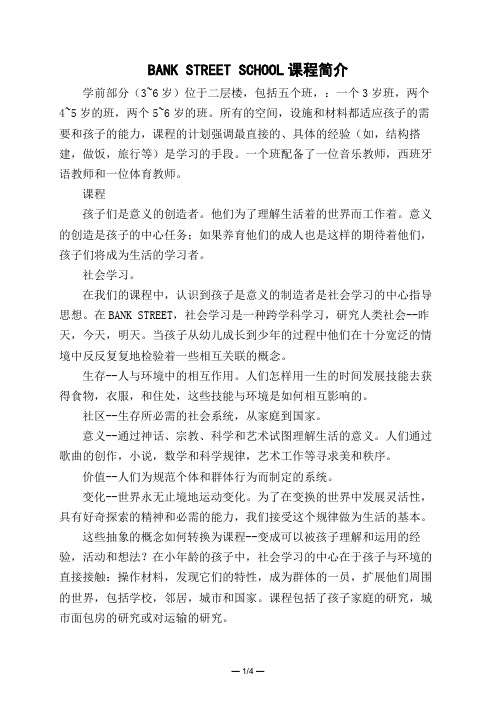
BANK STREET SCHOOL课程简介学前部分(3~6岁)位于二层楼,包括五个班,:一个3岁班,两个4~5岁的班,两个5~6岁的班。
所有的空间,设施和材料都适应孩子的需要和孩子的能力,课程的计划强调最直接的、具体的经验(如,结构搭建,做饭,旅行等)是学习的手段。
一个班配备了一位音乐教师,西班牙语教师和一位体育教师。
课程孩子们是意义的创造者。
他们为了理解生活着的世界而工作着。
意义的创造是孩子的中心任务;如果养育他们的成人也是这样的期待着他们,孩子们将成为生活的学习者。
社会学习。
在我们的课程中,认识到孩子是意义的制造者是社会学习的中心指导思想。
在BANK STREET,社会学习是一种跨学科学习,研究人类社会--昨天,今天,明天。
当孩子从幼儿成长到少年的过程中他们在十分宽泛的情境中反反复复地检验着一些相互关联的概念。
生存--人与环境中的相互作用。
人们怎样用一生的时间发展技能去获得食物,衣服,和住处,这些技能与环境是如何相互影响的。
社区--生存所必需的社会系统,从家庭到国家。
意义--通过神话、宗教、科学和艺术试图理解生活的意义。
人们通过歌曲的创作,小说,数学和科学规律,艺术工作等寻求美和秩序。
价值--人们为规范个体和群体行为而制定的系统。
变化--世界永无止境地运动变化。
为了在变换的世界中发展灵活性,具有好奇探索的精神和必需的能力,我们接受这个规律做为生活的基本。
这些抽象的概念如何转换为课程--变成可以被孩子理解和运用的经验,活动和想法?在小年龄的孩子中,社会学习的中心在于孩子与环境的直接接触:操作材料,发现它们的特性,成为群体的一员,扩展他们周围的世界,包括学校,邻居,城市和国家。
课程包括了孩子家庭的研究,城市面包房的研究或对运输的研究。
中班的孩子开始研究他们社区的历史,以前居住在社区的居民的生活,如早年丹麦殖民者或美国土著人。
他们不仅通过各种经验学习,如阅读和电影,还通过展开讨论,参观博物馆和考古发现地点以及古迹的重建地。
《幼儿园保育教育质量评估指南》的英文

《幼儿园保育教育质量评估指南》的英文The Guideline for Quality Evaluation of Kindergarten Care and EducationIntroductionThe Guideline for Quality Evaluation of Kindergarten Care and Education is designed to provide a comprehensive framework for assessing the quality of care and education in early childhood settings. It aims to promote the development of high-quality kindergarten programs that support the holistic development of young children.PurposeThe purpose of this guideline is to ensure that kindergarten care and education programs provide a safe, nurturing, and stimulating environment for young children. It also aims to promote the use of developmentally appropriate practices that support children's physical, social, emotional, and cognitive development.Key Areas of EvaluationThe guideline outlines key areas of evaluation that include:1. Health and Safety: This area focuses on ensuring that the kindergarten environment is safe, clean, and free from hazards. It also addresses the implementation of health and hygiene practices to promote the well-being of young children.2. Curriculum and Instruction: This area examines the curriculum and teaching practices to ensure that they are developmentally appropriate and support children's learning and development across various domains.3. Physical Environment: This area evaluates thephysical space of the kindergarten, including indoor and outdoor facilities, to ensure that they are conducive to children's learning and exploration.4. Family and Community Engagement: This area assessesthe extent to which the kindergarten program fosterspositive relationships with families and engages the community in supporting children's learning and development.5. Professional Development and Staffing: This area focuses on the qualifications, training, and ongoing professional development of kindergarten staff to ensure high-quality care and education for young children.Evaluation ProcessThe guideline provides a detailed process for conducting evaluations, including the use of observation, interviews, and documentation review. It also emphasizes the importance of involving stakeholders, such as parents, staff, and community members, in the evaluation process.ConclusionThe Guideline for Quality Evaluation of Kindergarten Care and Education serves as a valuable tool for promoting continuous improvement in kindergarten programs. By using this guideline, early childhood settings can ensure that they are providing high-quality care and education that meets the needs of young children and their families.《幼儿园保育教育质量评估指南》引言《幼儿园保育教育质量评估指南》旨在为评估早期教育环境的质量提供全面的框架。
幼儿教专业育英文
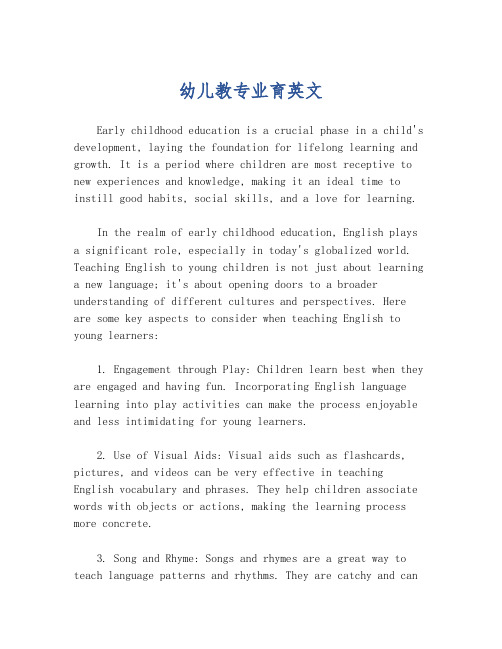
幼儿教专业育英文Early childhood education is a crucial phase in a child's development, laying the foundation for lifelong learning and growth. It is a period where children are most receptive to new experiences and knowledge, making it an ideal time to instill good habits, social skills, and a love for learning.In the realm of early childhood education, English plays a significant role, especially in today's globalized world. Teaching English to young children is not just about learning a new language; it's about opening doors to a broader understanding of different cultures and perspectives. Here are some key aspects to consider when teaching English to young learners:1. Engagement through Play: Children learn best when they are engaged and having fun. Incorporating English language learning into play activities can make the process enjoyable and less intimidating for young learners.2. Use of Visual Aids: Visual aids such as flashcards, pictures, and videos can be very effective in teaching English vocabulary and phrases. They help children associate words with objects or actions, making the learning process more concrete.3. Song and Rhyme: Songs and rhymes are a great way to teach language patterns and rhythms. They are catchy and canhelp children remember words and phrases more easily.4. Storytelling: Reading stories in English to children can improve their listening skills and expand their vocabulary. It also fosters a love for reading and exposes them to different narrative styles.5. Interactive Learning: Encouraging children to participate in conversations and activities can boost their confidence in speaking English. Role-playing and interactive games are excellent tools for this.6. Language Immersion: Whenever possible, creating an immersive environment where English is the primary mode of communication can significantly enhance language acquisition.7. Positive Reinforcement: Praising children for their efforts and progress can motivate them to continue learning and experimenting with the language.8. Cultural Exposure: Teaching English should also involve introducing children to the cultures where English is spoken. This can be done through stories, music, and food from different English-speaking countries.9. Parental Involvement: Parents play a vital role in supporting their children's language learning journey. Encouraging parents to engage with their children in English at home can reinforce what is learned in school.10. Continuous Assessment: Regularly assessing children'sprogress can help identify areas of strength and those that need more attention. This should be done in a way that is constructive and supportive.In conclusion, teaching English to young children should be a holistic and enjoyable experience. It's about nurturing a love for the language and providing them with the tools they need to communicate effectively in a global context.。
展望未来1英语Unit2单词词组

1. recognize v.2. mother tongue3. Europe n.European adj.4. dream n./v.5. apart from sth./sb.6. join v7. intention n.have the intention of doing sth.\have no intention of doing intend v. ~to do sth.8. overseas adj.\adv.9. retire v.retired adj. retirement n.10. cookery n.cook n.\v.cooker n.(sth.)11.speciality n.special adj.specialy adv. especiallyspecialise in doing sth.12. fee n.13. image n.14. informal adj.(formal)15. qualification n.16. childcare n.17. learn to do sth18. accuracy n.accurate adj.19.confident adj.confidence n.be confident about sthhave confidence in sth20.paint in water colour write in red ink write with black pens21.intermediate22.improve v.improvement n.23.keep fit and healthy to music24.stay in a good shape25.photography n.26.set up sthset-set-set27.guitarist n.piano-pianist n.28.attend v.29.local adj30.workshop n.31.quite a few classes=many\a large number of32.in any one term33.in fact=actually34.run the playgroups(playschools)35.after all36.a wide range of courses=a wide variety of courses37.philosophy n.38.village n.39.particular adj.in particular(especially)particularly adv.40.correct v.corrected adj.41.identify v.(recognize) identification n,42.insect n.[C]43.social adj.society n.44.repair n.45.automobile(car) n.automotive adj.46. trainer n.47.sth as well as sth48.academic adj.49.normal adj.(abnormal)50.vocational adj.vocation n.51.improve students’ minds52.be available to sb,53.a course in automotive repair54.take place(happen)55.practical adj.practice n.56.be situated=be located=be set=be57.on a high school campus58.train v.train sb. to dotrain sb. in sth,59.in the groups of 18(students)60.individual n. (one person)61.goal n.62.deal with sth.\sb. (deal with=solve=work out)。
英国基础阶段教育(3—5岁)课程指南

英国基础阶段教育(3—5岁)课程指南下载提示:该文档是本店铺精心编制而成的,希望大家下载后,能够帮助大家解决实际问题。
文档下载后可定制修改,请根据实际需要进行调整和使用,谢谢!本店铺为大家提供各种类型的实用资料,如教育随笔、日记赏析、句子摘抄、古诗大全、经典美文、话题作文、工作总结、词语解析、文案摘录、其他资料等等,想了解不同资料格式和写法,敬请关注!Download tips: This document is carefully compiled by this editor. I hope that after you download it, it can help you solve practical problems. The document can be customized and modified after downloading, please adjust and use it according to actual needs, thank you! In addition, this shop provides you with various types of practical materials, such as educational essays, diary appreciation, sentence excerpts, ancient poems, classic articles, topic composition, work summary, word parsing, copy excerpts, other materials and so on, want to know different data formats and writing methods, please pay attention!I. Introduction。
In the United Kingdom, children aged 3 to 5 years old are in the Foundation Stage of education. This stage is crucial for laying the foundation for future learning and development. The curriculum for this age group focuses on providing children with a broad range of learning experiences to help them develop socially, emotionally, physically, and academically.。
- 1、下载文档前请自行甄别文档内容的完整性,平台不提供额外的编辑、内容补充、找答案等附加服务。
- 2、"仅部分预览"的文档,不可在线预览部分如存在完整性等问题,可反馈申请退款(可完整预览的文档不适用该条件!)。
- 3、如文档侵犯您的权益,请联系客服反馈,我们会尽快为您处理(人工客服工作时间:9:00-18:30)。
Some people think that all young people should take childcare courses. To what extent do you agree or disagree with this opinion?
Child care providers are children's first teachers and quality care from a young age can have a huge impact on the future successes of children. Many people think that all young people should attend child minding trainings because it would benefit their offspring. From my own perspective, I do not agree with this point of view.
Granted, advocates of childcare courses may posit that attending these courses could have a positive influence on children. To be more specific, young people, in most cases, are potential parents and they would have to raise their own babies in the future while childcare course are not available in formal education. If the younger generation would gain some sights into bringing up babies by taking childcare courses, their children would be raised in a more professional and scientific method. This, in turn, plays an imperative role in children development in the long run.
Be that as it may, it is not necessarily for all young people to take child preschool trainings despite trainings can provide a host of benefits. These training courses are quite expensive for most young people who may just graduate form universities. In this case, for those who want to gain knowledge about childcare, they are more willing to use other alternatives like free online courses. In addition, different form the older generation, young people may find it is hard and time-consuming to raise babies by themselves due to their extremely busy daily routines extremely busy and their priorities. Consequently, they would tend to hire certificated day-care providers or send their babies to care centres helping them to look after their children if they have babies in the future. Thus, it can be deemed that forcing all young people to take childcare course is not justified and practical.
In conclusion, my contention is not all young people should take childcare courses and whether they should do this really depends on different individuals.
1.语法6-6.5
2.词汇6.5
3.论证清晰合理,只是你提供的论据很勉强很钻牛角尖
Reference /wiki/Child_care。
